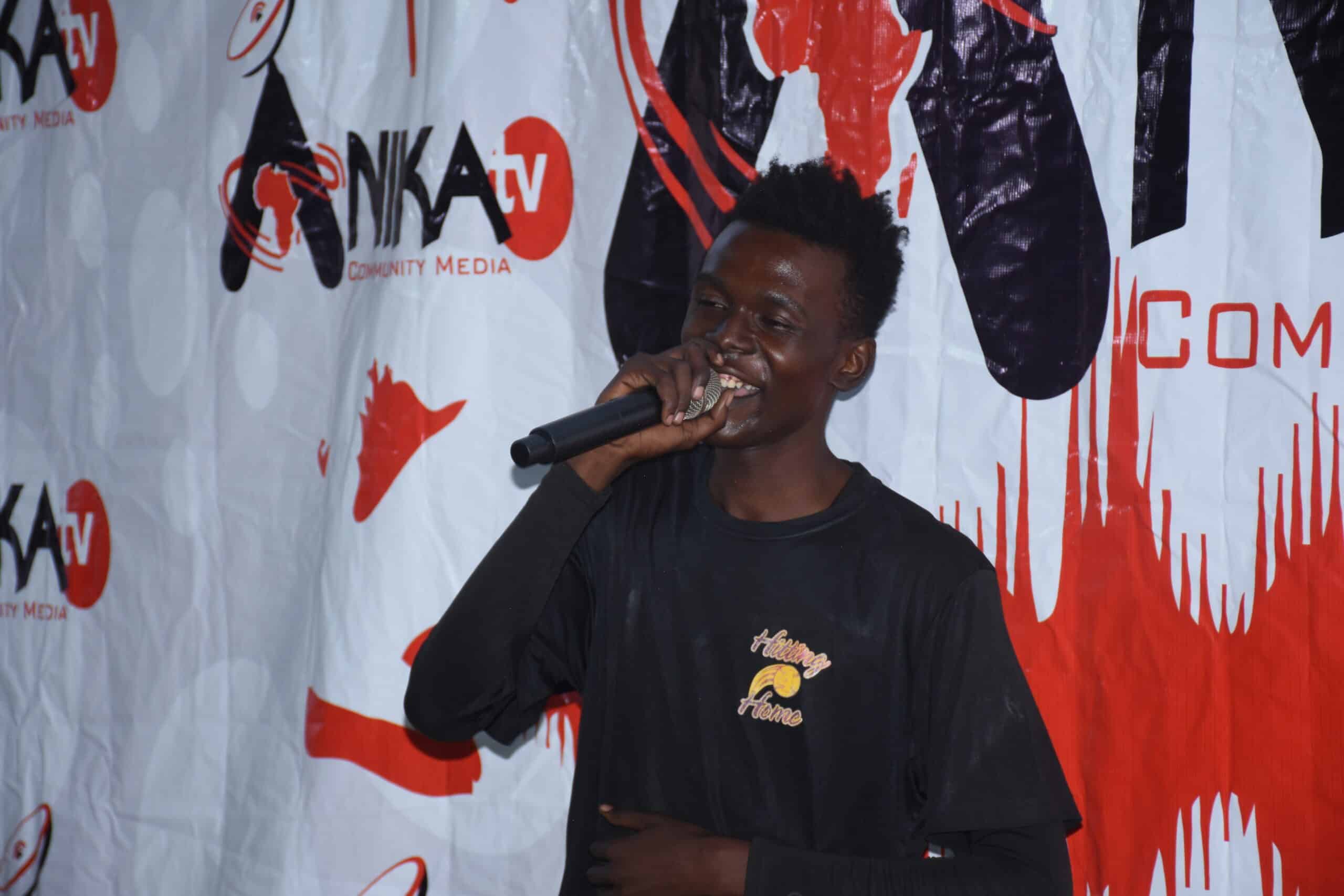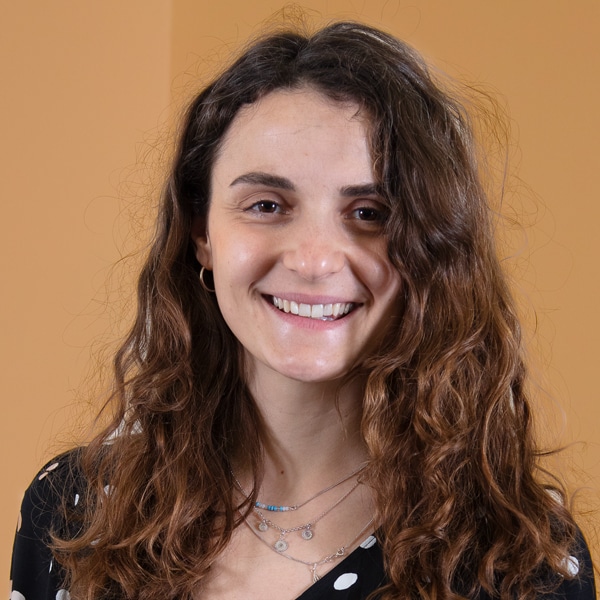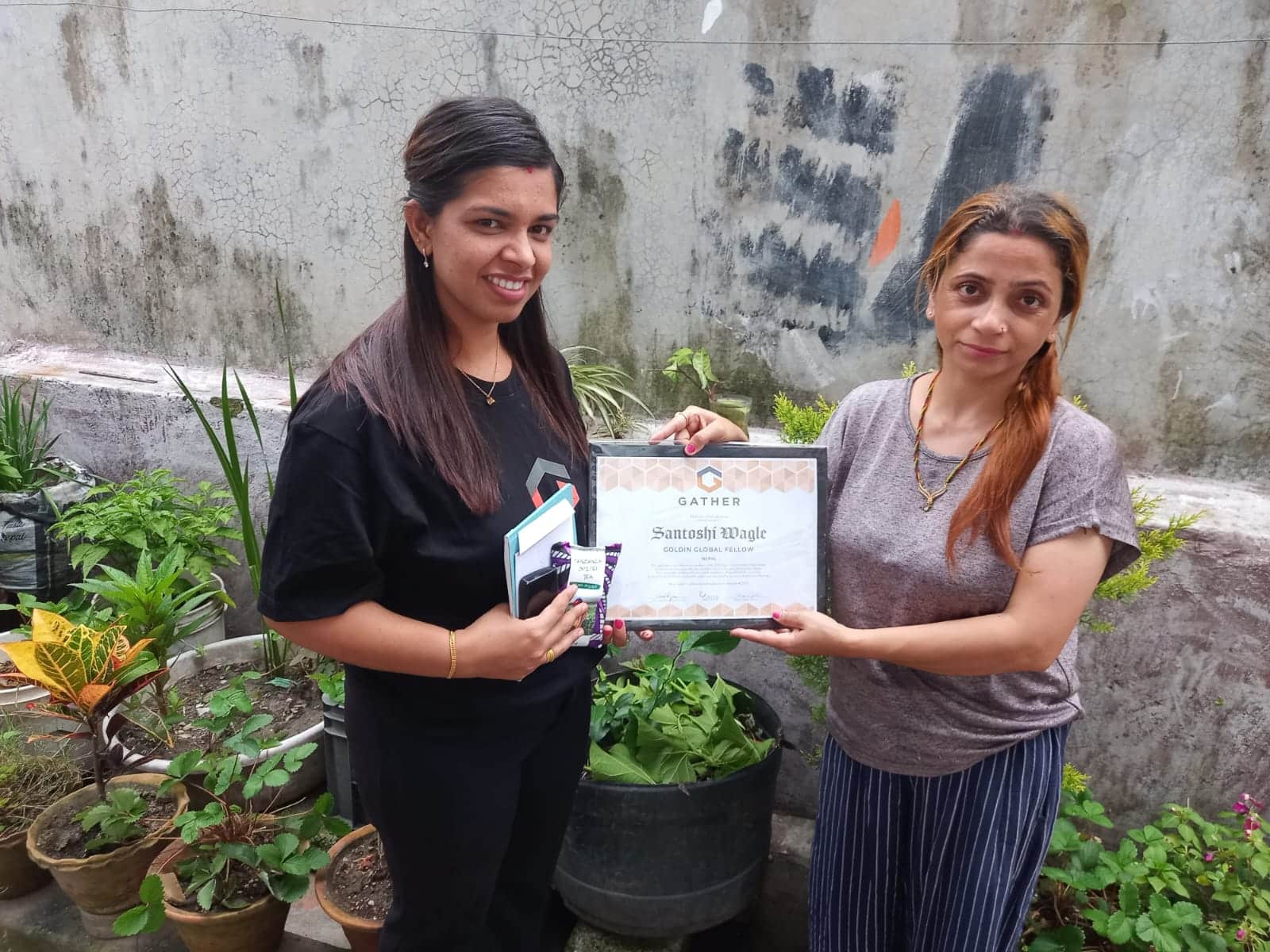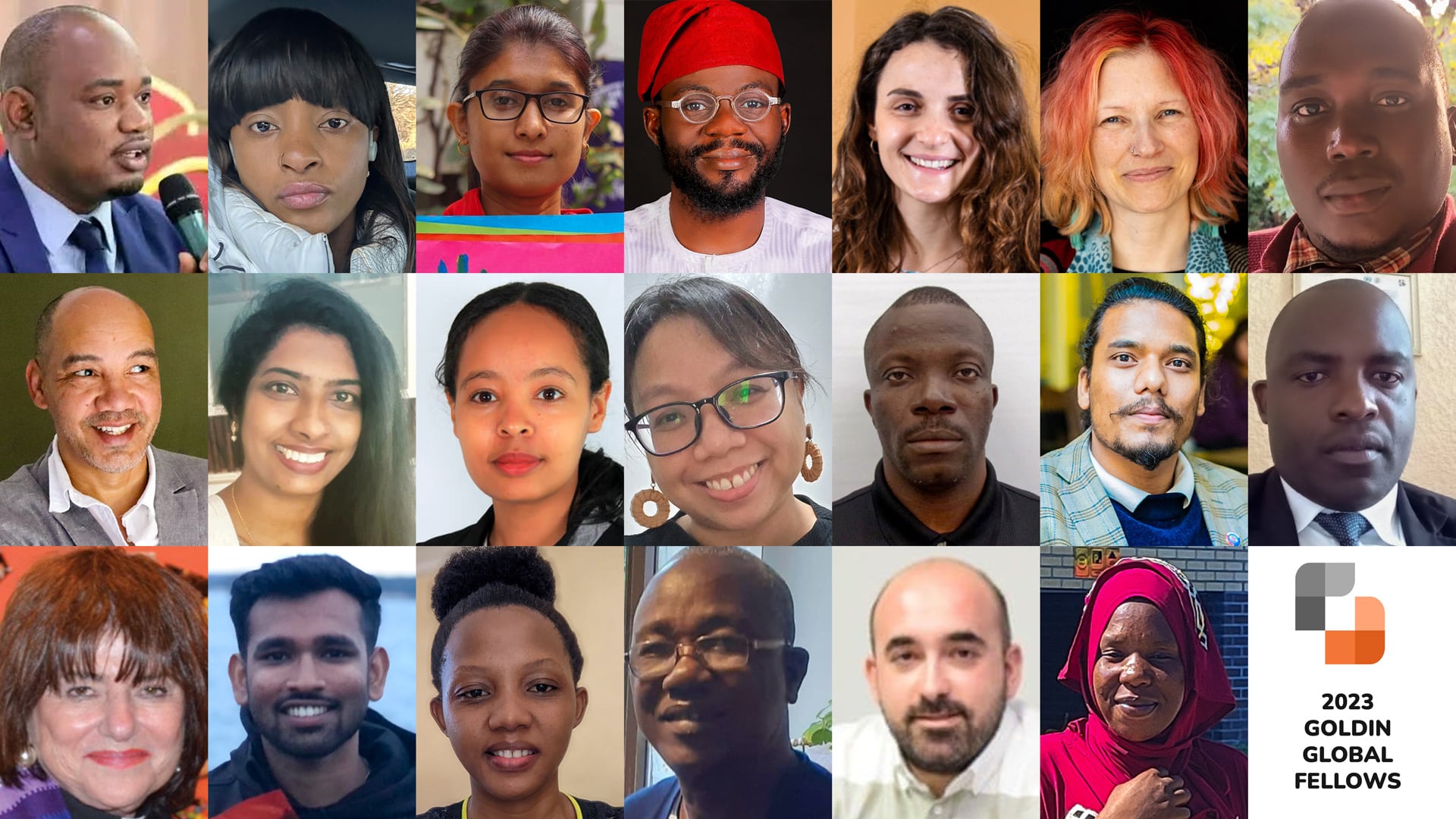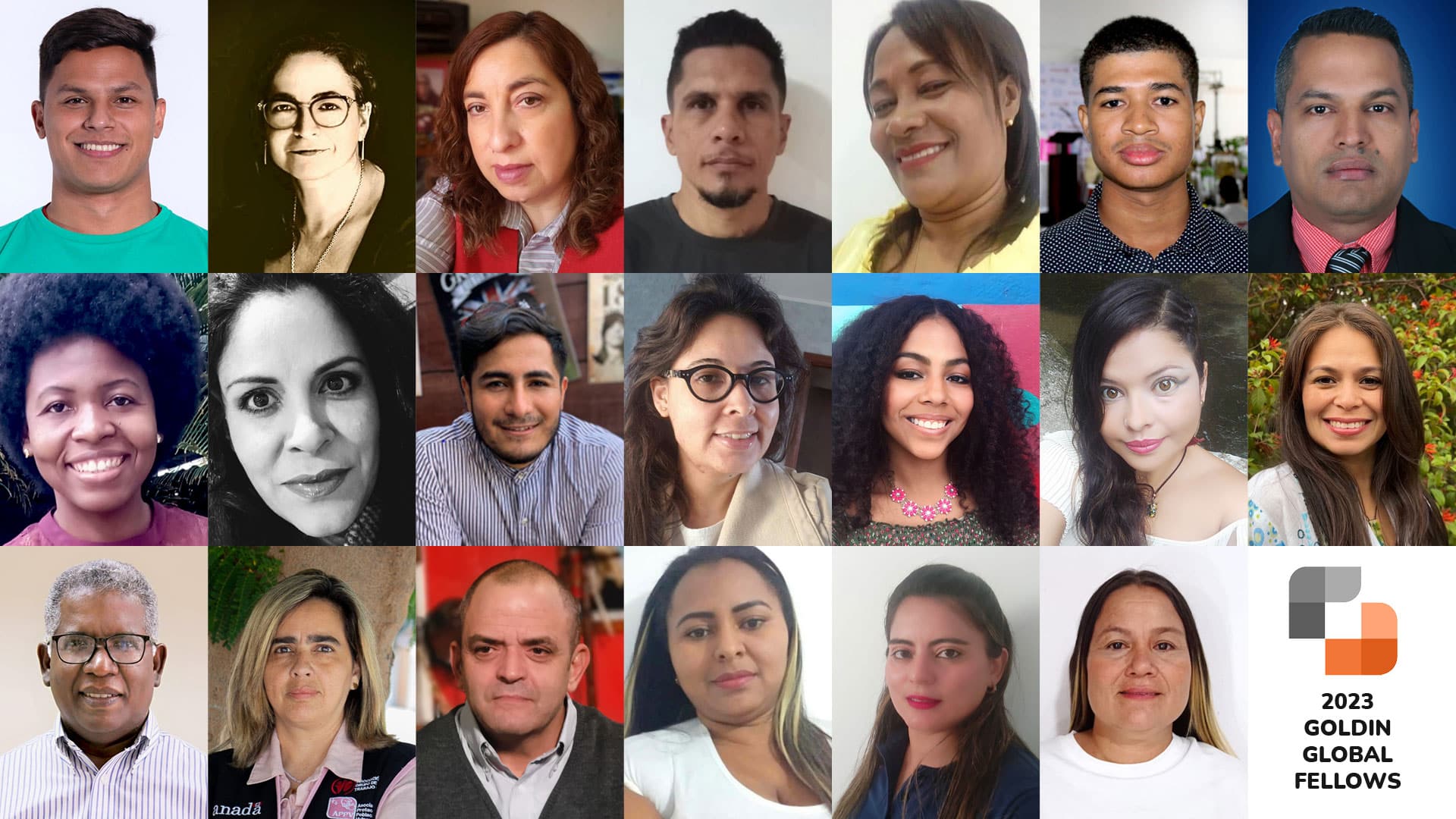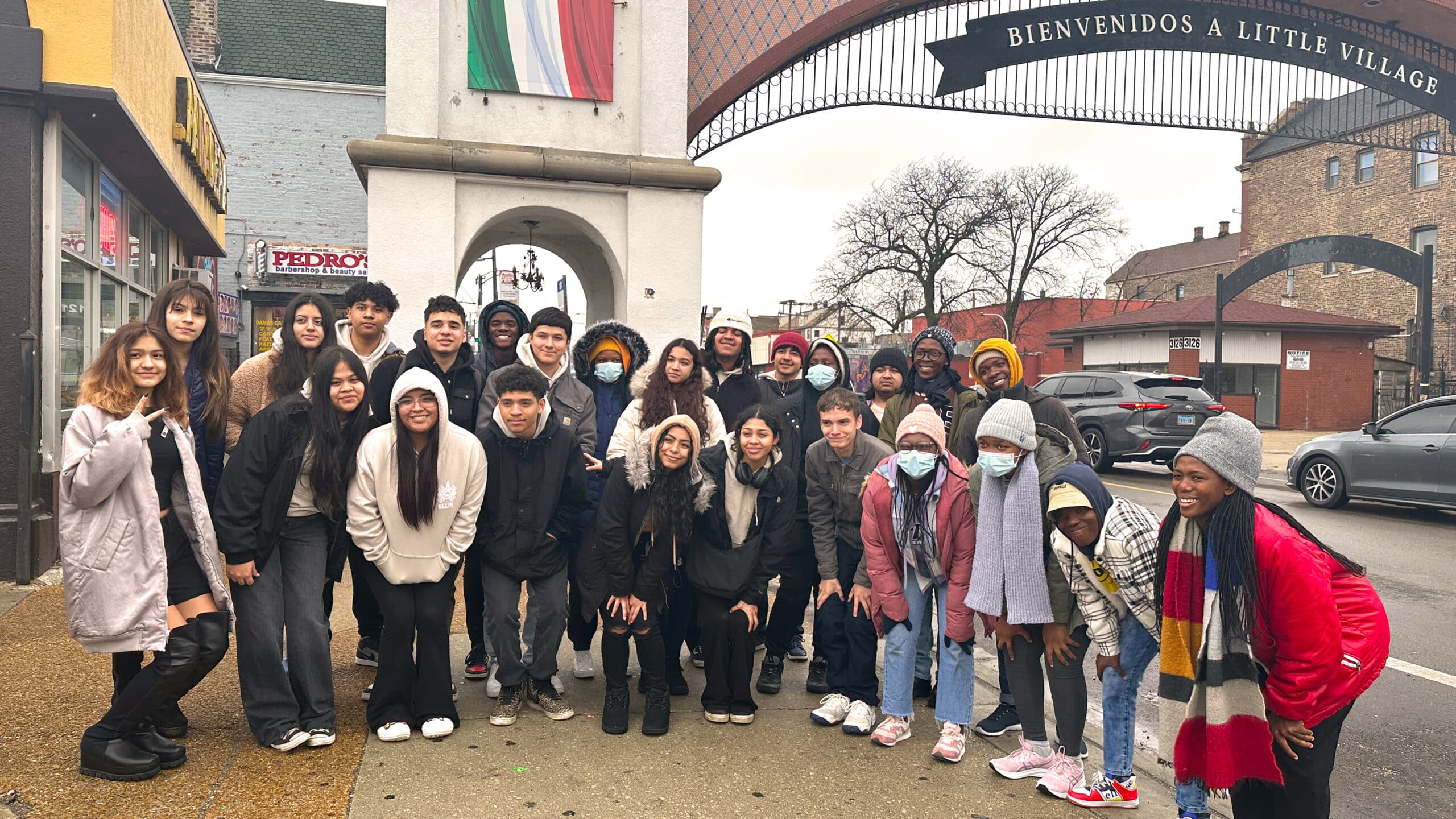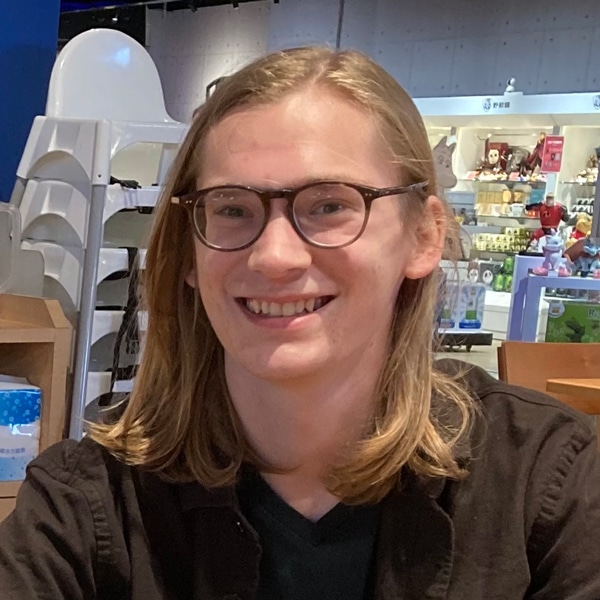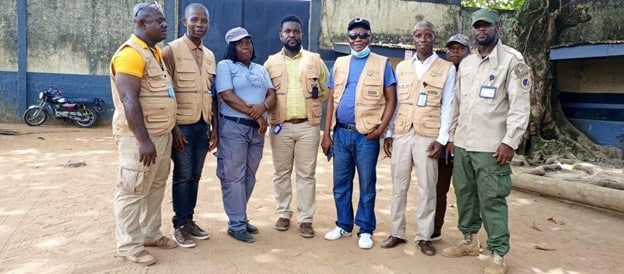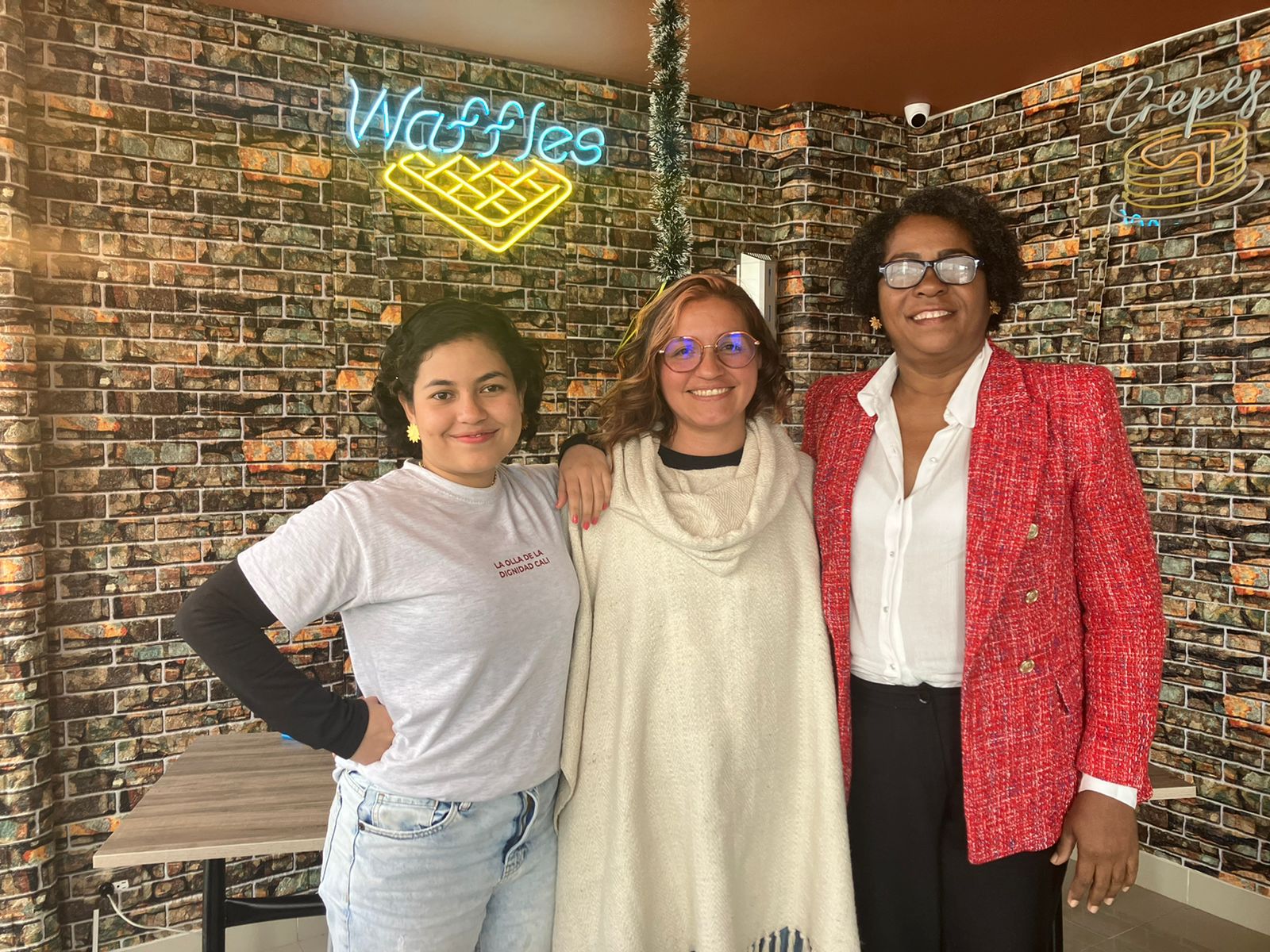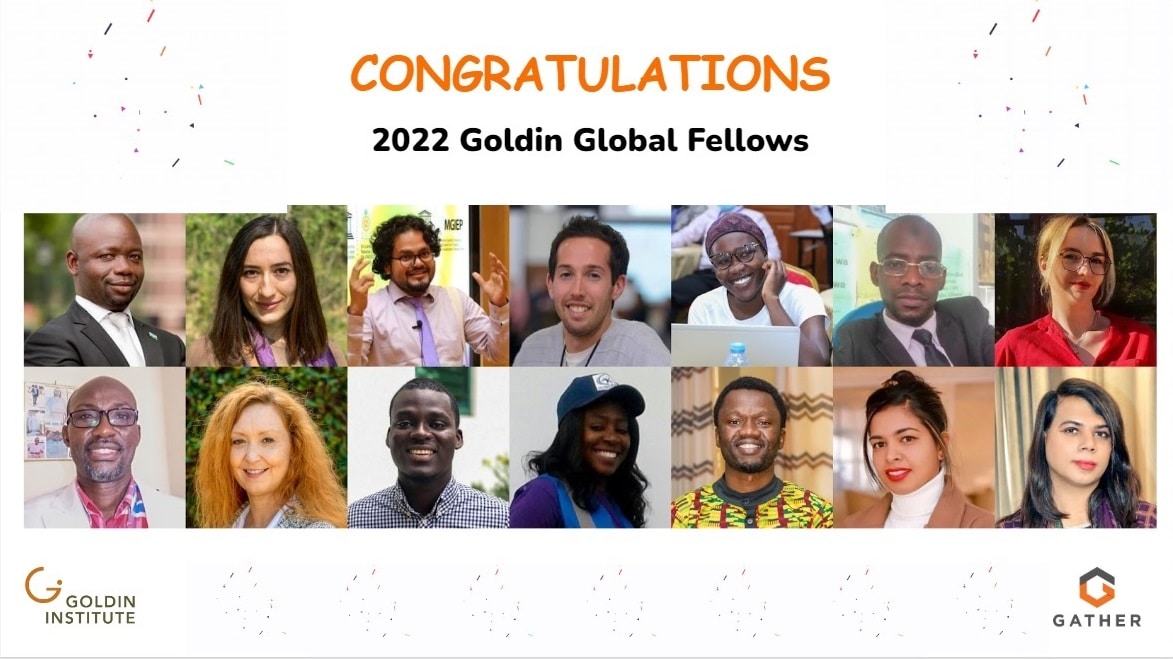Anika Talent Show: Empowering Kenya's Youth for Environmental Education
Visual artists, dancers, poets, thespians, and vocalists between the ages of 14 and 25 were brought together in a lively event in Kenya promoting green skills and environmental justice, aligning with the International Youth Day 2023 theme.
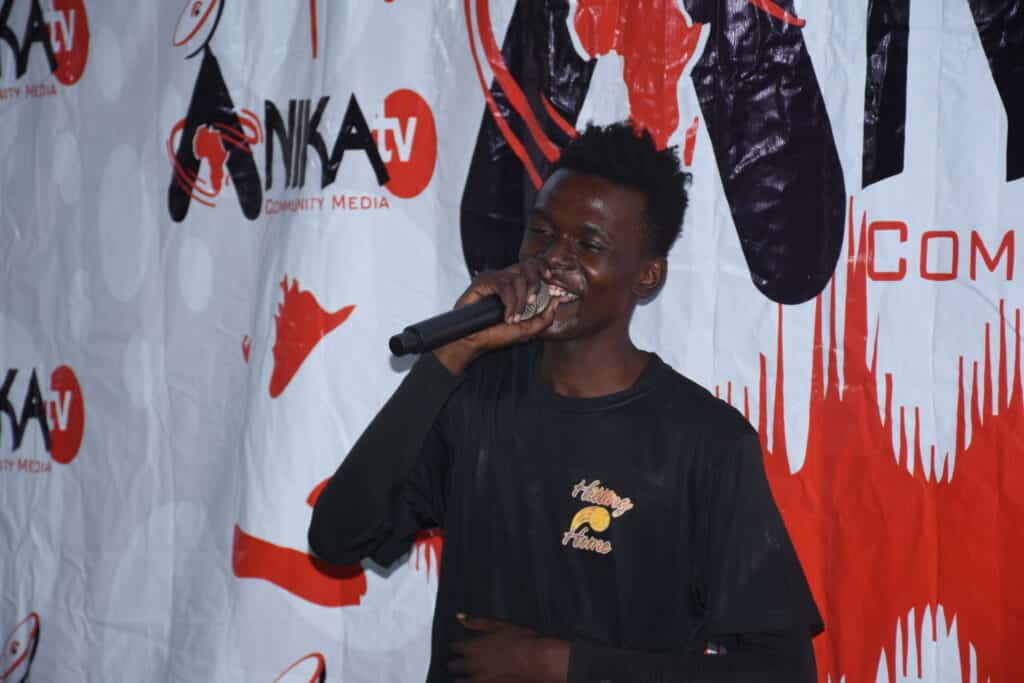
This event was made possible by Nicholas Songora, 2021 Goldin Global Fellow from Kenya and Founding Director Manyatta Youth Entertainment, and his dedicated team behind organizing the Anika Talent Show in celebrating International Youth Day in Partnership with the Forum civ Eastern and Southern Africa hub under the Wajibu Wetu; Jumuika Sikika Program with collaboration from the private sector, religious leaders, persons with disabilities leadership, national and county governments.
Nicholas speaks more to the Goldin Institute about this activity and why it represents a movement that harnesses the power of art to drive change.
He believes that people together can create a sustainable world where everyone, through artivism, contributes to a brighter future. Already, he is leaving his mark on infusing positive change and possibilities among young people.
Nurturing the Youth as Change Agents for Environmental Issues
This gathering equipped young people with green skills and a profound understanding of environmental justice while utilizing the transformative potential of arts to foster sustainability in society.
Nicholas delves into how they incorporated sustainability and environmental justice in this event.
“The activity involved performances like dance and music that narrated stories of environmental struggles, resilience, and hope. These performances fostered empathy, understanding, and a sense of responsibility toward the planet. This was a powerful medium to raise awareness about environmental challenges.” - Nicholas Songora
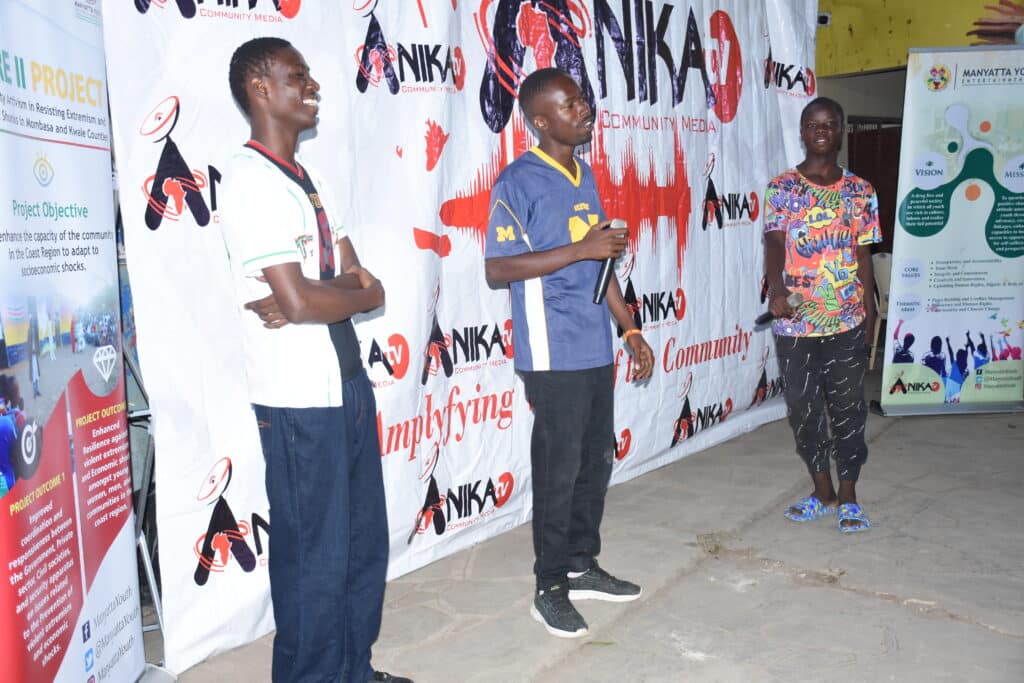
He highlights that photographers pledged to vividly portray environmental issues, ecological beauty, and the consequences of unsustainable practices through art exhibitions.
From the interactive discussion, participants, including village elders, engaged in addressing climate change challenges. They shared personal experiences and ideas for climate action, including sustainable agriculture, waste management, and energy conservation.
Strengthening Community Work through Networking
Further, he expresses his gratitude to several collaborative partners who contributed to the success of the Anika Talent Show.
“As an organization, we prioritize a multi-sectorial approach in programs and project management. According to our strategic focus, one of our critical mandates is to create linkages and alliances with other like-minded organizations and institutions.”
Therefore, Nicholas adds building partnerships and collaborations places the organization at the center of decision-making tables at the county, regional, and national levels.
“This has fostered community ownership and has enhanced sustainability. We collaborate closely with the national and county governments, the private sector, and religious institutions. Also, we collaborate with youth, women, and persons with disabilities networks while forming part of the civil society leadership in Kenya's Coastal region.”
He sees collaboration as fostering cost efficiency and effectiveness, sustainability, and long-term impact accepted by the masses.
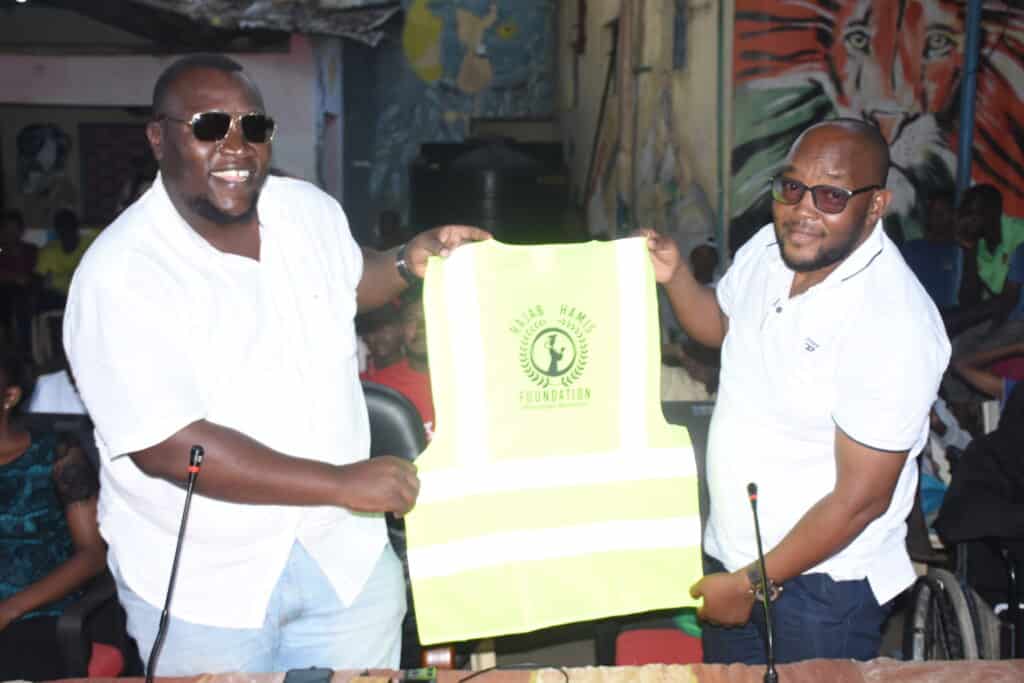
The Lasting Impact of the Goldin Institute Fellowship and Looking Forward
Nicholas acknowledges that he applied the key strategies learned from the Goldin Global Fellowship, from planning to executing the Anika Talent Show.
“Through design, we applied the concept of community asset mapping, which we learned during the Goldin Global Fellowship. In this step, we reflected on the available stakeholders at the grassroots and national levels.”
Further, he elaborates on how they divided into mapping the available resources and funding to support the initiative.
“Identifying potential collaborators was easy, including nominating young people to lead in the activity. Mapping of potential artists within the Anika Community Hub and inviting more from the community.”
Conclusively, drawing from his experience, Nicholas shares his advice with aspiring young people and how they can play a proactive role in their communities.
“The #YouthTribe is a powerful family with all it takes to change the existing narrative and achieve a green economy as a global identity.” he says.
“In most countries, youth form the largest percentage of the population; for example, in my country, Kenya, we are approximately 80% of the population but cannot make a difference if we keep working in isolation. We must unify our voices, be counted, and influence our way to the decision-making table through dialogue and collaboration.”
He draws our attention to the fact that youth cannot win by competing or fighting other stakeholders but by embracing the unity of purpose and fostering collaboration.
Nicholas calls youth to “rise and start building partnerships and networks with multi-stakeholders.”
Interfaith Advocacy to Promote Children's Safety in the Philippines
This July Andy Alegre, 2021 Goldin Global Fellow from the Philippines, engaged in the Regional G20 Interfaith Meeting in Manila (the capital city of the Philippines), moderating a session focused on the online sexual exploitation of children. In this piece, he speaks to Goldin Institute about his experience at the meeting and lessons learned. He also shares a few tips on communicating and working with people from diverse backgrounds while respecting differences to solve issues affecting the community.
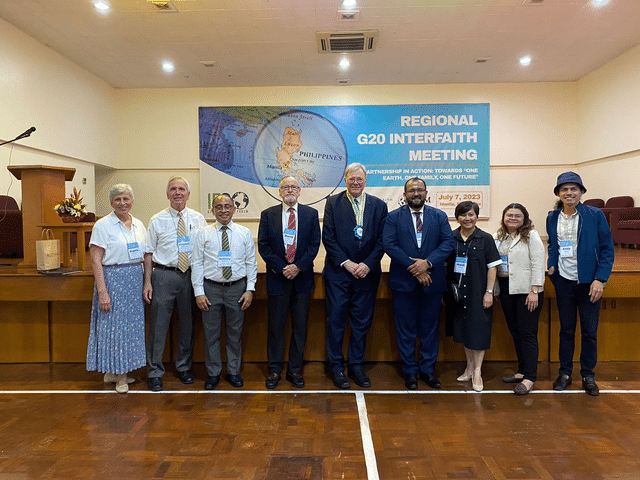
Andy, a people person, emphasizes how being a Global Fellow and offered him global perspectives from his peers during weekly roundtable discussions and connections and during monthly Alumni network roundtables.
He starts our conversation with the Regional G20 Interfaith Meeting in Metro Manila. The five issues highlighted in the meeting were: 1. the interacting demands of climate reform and humanitarian action, 2. emerging challenges of online sexual exploitation, 3. trafficking and modern forms of slavery, 4. children’s education concerning their rights, especially in conflict and abuse situations, 5. protection of freedom of religion and belief.
“It was an excellent opportunity for me to actively know, engage, share, and learn from faith leaders and experts from the government, non-government organizations, and communities on issues that affect most Filipinos.” -
Andy Alegre
The engagement and meeting were significant for Andy, his advocacy, and his community because, according to him, they amplified the issue to various leaders and promoted collaborative recommendations and action.
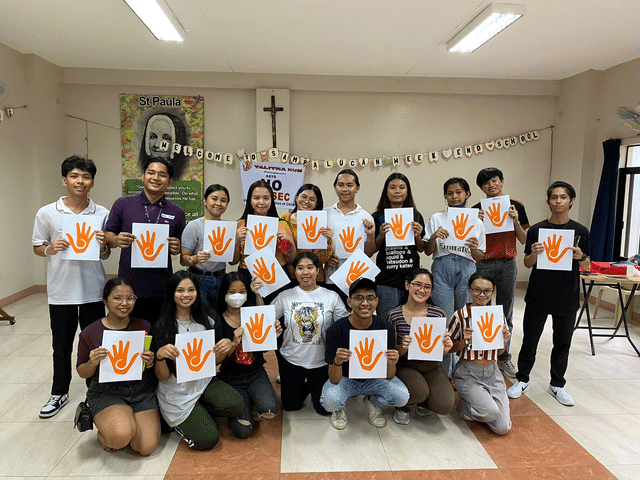
The Importance of Embracing Differences in Interfaith Settings
After the plenary session of experts sharing the five topics, almost 90 meeting participants were divided into five groups based on the thematic areas. Andy moderated one of the breakout sessions, focused on the online sexual exploitation of children, with 29 attendees which he states did not go without its challenges.
“The breakout session was designed to elicit recommendations from attending representatives from various government agencies, non-government organizations, faith-based communities, and networks. I started by calling in some discussion starters to share challenges, best practices, and initial recommendations on the issue.”
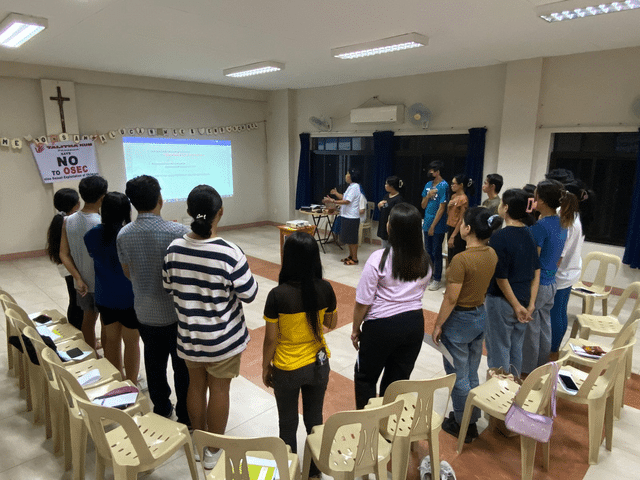
Andy recalls that one of the challenges moderating the session was balancing the time for all breakout attendees to elicit valuable input and stay on the course of the discussion quickly: “Some participants wanted to share much input, but the session had a limited period, and I had to gently remind them to wrap up so as not to take the time reserved for others.”
Another challenge, Andy adds, was summarizing the main points shared and ensuring that all recommendations were captured when wrapping up the discussion. Since he engaged with representatives from the government, church institutions, academia, and faith-based organizations, he also shared some advice on how to best work with people from different backgrounds. He reminds us of the importance of valuing anyone with a unique way of expressing, responding, and contributing to solving an issue that affects us.
“Embracing differences and respectful acceptance are approaches I use when working with people from various backgrounds. I also ensure to address them with the title that they want to be addressed. It is also helpful for me to engage these various representatives because of my experience serving in these institutions and knowing the system and culture.”
- Andy Alegre
Andy believes that being respectful and open are valuable traits that allowed him to be successful in his engagements.
Meeting with International Advocates in the GATHER Platform
Andy met grassroots leaders from around the world two years ago to learn and work together, as a Community of Practice, through the Goldin Global Fellows program, which he cherishes today. “My experience as a Goldin Fellow has been excellent as I learned valuable lessons, methods, tools, and approaches in my community development and engagement work.” he says.
While discussing influential resources, Andy mentions the GATHER platform:
“The GATHER platform tremendously contributed to my learning as a professional and community activist. The platform was easy to navigate and use and facilitated intuitive and practical learning by providing useful concepts and examples for community leaders like me."
- Andy Alegre
In addition to the content on the platform, what enriched Andy's learning was his fellow cohort members' meaningful and valuable reflections and contributions. “I also appreciate that the program is so inclusive – multi-generation, multi-faith - with fellows from all over the world with diverse backgrounds and identities” he says in a conclusive note.
Suggested Article:
Meet the 2023 Goldin Global Fellows English Language Cohort
Grassroots Peace Building in Nepal
Santoshi Wagle, a 2022 Goldin Global Fellow and non-violent communication (NVC) trainer for NVC Practise Group in Nepal, shares her experience and reflections leading an event for International Peace Day 2022 in her own country, Nepal. Santoshi unpacks her challenges, the lessons she learned, and the profound impact she is making by using the skills she gained through her Goldin Fellowship and the GATHER platform.
During International Peace Day, students, youths, and community groups came together to celebrate: “The participants explored the existing conflicts and causes of violence, the role of peacebuilder, qualities of peacebuilder peace-building process, emotional awareness, emotional regulation, and conflict transformation,” Santoshi explains. Coming together was necessary for the community to address common issues and find practical solutions and action plans for sustainable peace and social change. "With the growing conflict among humans at internal and external levels, the event turned out to be a self-reflective program.” she adds.
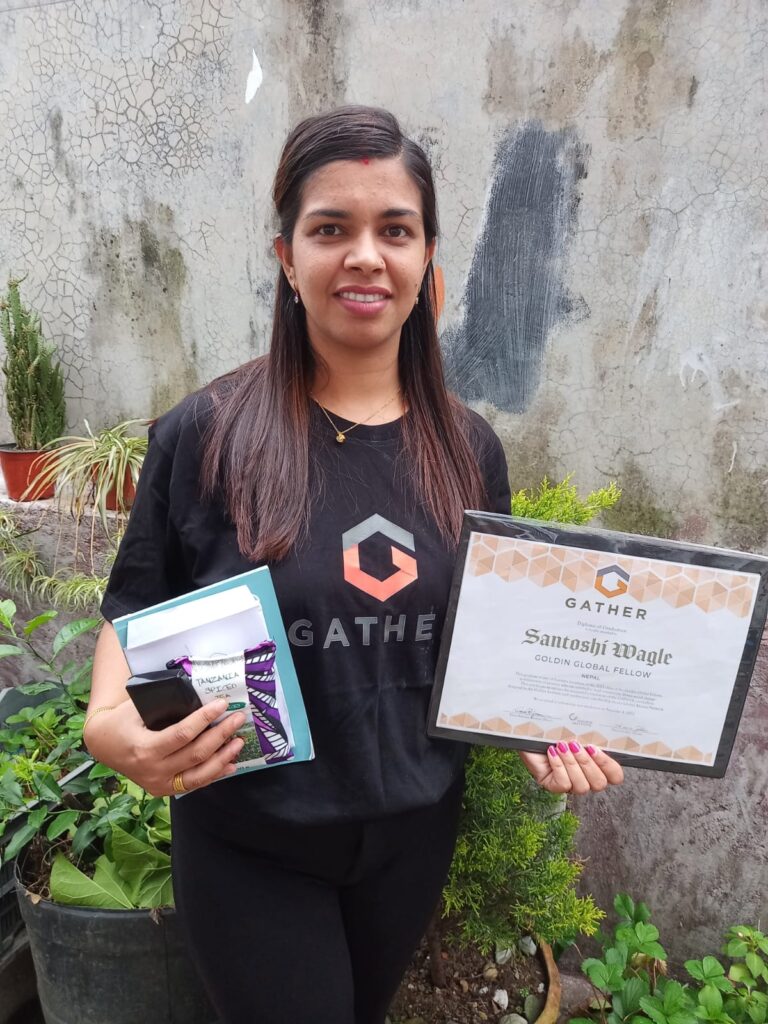
Training Women and Children on Peace Building
These community initiatives come with challenges and hardships too. Santoshi particularly emphasized the challenge of bringing a group of women together in Nepal: "Despite their interests and will, it was challenging for women to find the time for this activity because of their responsibility to care for their children and daily work.” Nevertheless, in collaboration and coordination with her local partners, namely NVC Practice Group Nepal, Radha Krishna Aama Samuha (women group), and Srijana Secondary School, a coalition was able to cover travel expenses and create some allowances for women participants: “We also managed a caregiver to care for children during the event, so we could include the mothers having small children.”
In hindsight, she also reflects on the importance of the event's timing and the arrangements of essential expenses for participants and programming. For this, Santoshi emphasizes the pivotal role of safe circles: "Those safe circles are where we can discuss and empower the groups to discuss widely in the community event, so every voice can be expressed and fully heard.” Safe circles allowed for both personal and programmatic need to be addressed by the community as a whole, rather than becoming the burden of one person.
She also acknowledges how this one-time event turned out very challenging to balance the power and openness among the participants: “Regular meetings and follow-up events are important for sustainability, awareness, and empowerment for promoting peace and social justice.”
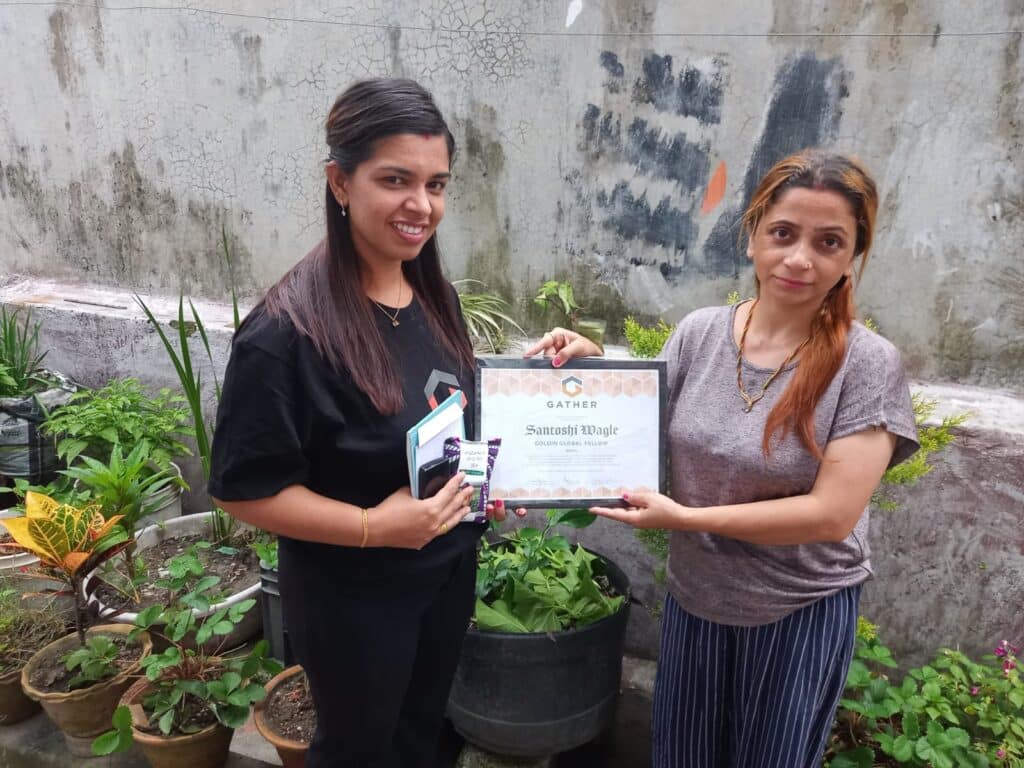
Connecting Nepal with an International Community
Santoshi connects the successful completion of this event with the skills she learned during the GATHER course while being a Goldin Global Fellow: “The creative insights that I learned during the course, in identifying community assets, community visioning summit, the idea of technical challenges and adaptive challenges, the importance of bringing the community together into the discussion for the collective issues and developing shared agreement and follow up were constructive in successful implementation and create wider impact in the community." “Gratitude to the Goldin family for the profound wisdom that I received during and after the fellowship”, she adds.
She and her team organize regular meetings, community events, and international day celebrations to strengthen grassroots communities and promote sustainable social change. This year, she is conducting workshops on nonviolent communication for teachers and women groups, continuing with women groups conducting safe listening circles and awareness programs against the dowry system and caste discrimination as a follow-up to last year's activities: “I invite the wider community to join this program and synergize to create a wider impact. Let's join hands to have peace and harmony in this land.”
Conclusively, she invites volunteers to join the programs in schools and communities, organized with her partner organizations The School of Nonviolence and Srijana Secondary Schools: “We offer an opportunity to learn, share and play with the wider community.”
Meet the 2023 Goldin Global Fellows English Language Cohort
by Yusuph Masanja, Co-Facilitator, Goldin Global Fellows
The Goldin Institute is proud to introduce the 2023 Goldin Global Fellows (English Language Cohort)!
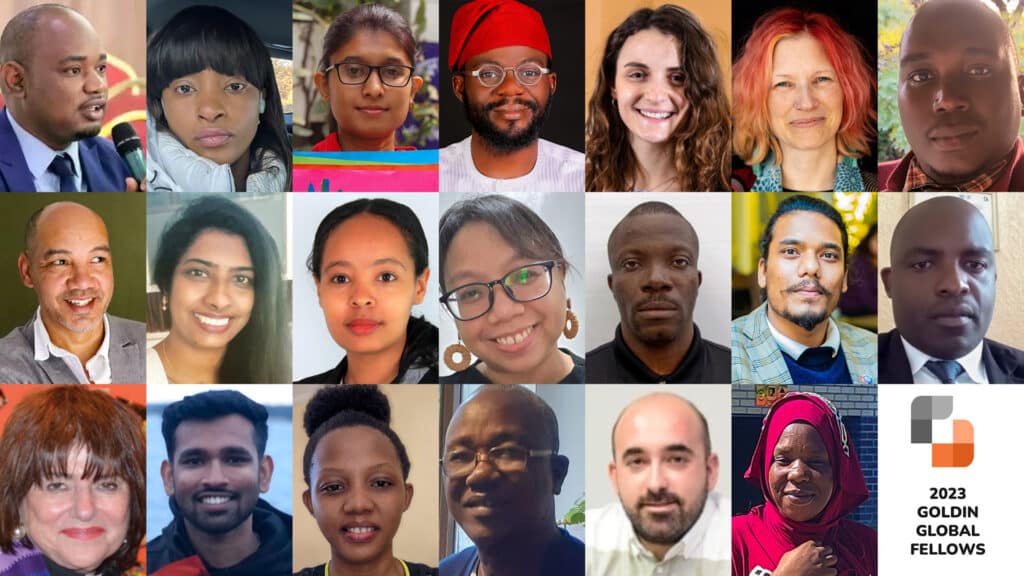
We invite you to learn about each of the outstanding Goldin Global Fellows who live and work in Albania, Bangladesh, Burundi, Cameroon, Ethiopia, India, Kosovo, Malawi, Mali, Nepal, Nigeria, the Philippines, Senegal, South Africa, Sri Lanka, Tanzania, the United States and Zimbabwe. This diverse group of fellows will learn and work together as a Community of Practice, building on the talents of their neighbors and the assets of their communities to make real and lasting change around the world.
ABOUT GATHER
The Fellows are learning together through GATHER, which is both a mobile platform for shared learning and a curriculum for people who want to build on the talents of their neighbors and the assets of their communities to make real and lasting change. Gather Fellows learn and work together through an innovative curriculum that comes pre-loaded on a tablet device with all the connectivity, materials, videos, practices and tools necessary to provide a mobile classroom and toolkit for community leadership.
The Goldin Global Fellows connects and equips grassroots leaders across the world to lead community driven social change. The 2023 Goldin Global Fellows is the fifth international cohort to utilize the GATHER platform, an online learning hub built by the Goldin Institute to empower grassroots leaders. They will engage in a 22-week course of intensive shared learning as well as group projects, culminating in a graduation event in Fall 2023. The curriculum has been designed and refined in collaboration with the Fellows themselves, based on their practical knowledge and hard earned wisdom, with input from a wide range of civic leaders.
To follow along the learning journey with the Goldin Global Fellows, please sign up for our newsletter and follow up on Twitter, Facebook and Instagram.
Meet the 2023 Goldin Global Fellows Spanish Language Cohort
by Lissette Mateus Roa, Co-Facilitator, Goldin Global Fellows
The Goldin Institute is proud to introduce the 2023 Goldin Global Fellows (Spanish Language Edition)!
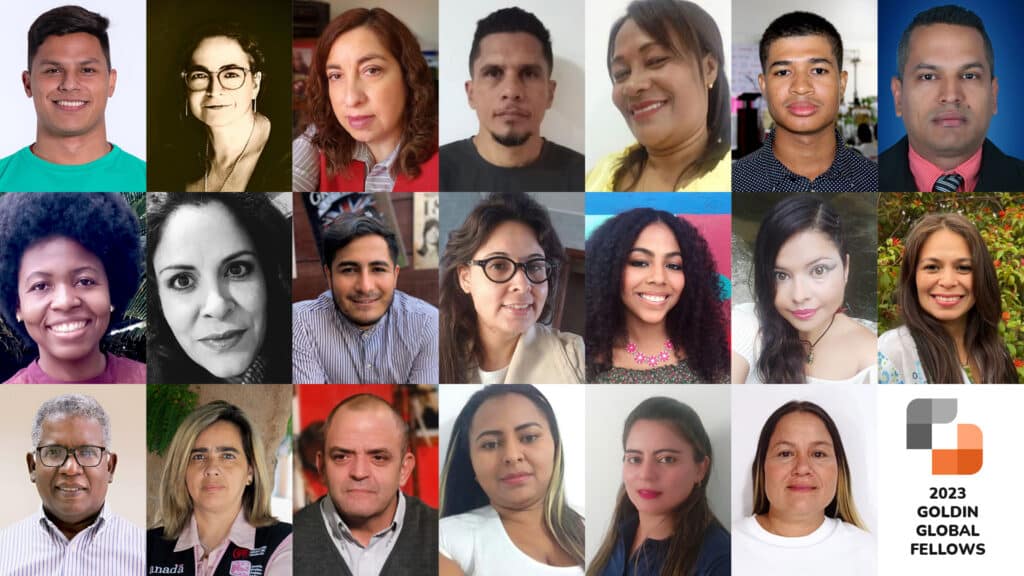
We invite you to learn about each of the outstanding Goldin Global Fellows who live and work in Chile, Colombia, Cuba, the Dominican Republic, Honduras, Mexico, Panama, Paraguay, Peru, Russia, the United States and Venezuela. This diverse group of fellows will learn and work together as a Community of Practice, building on the talents of their neighbors and the assets of their communities to make real and lasting change around the world.
The idea to have a Global Fellows program for Spanish speakers was suggested by 2018 Global Fellow Lissette Mateus Roa from Colombia who is the lead facilitator for this cohort. Lissette recognized that her home country of Colombia is one of the most dangerous countries to be an activist or social leader, and where solidarity and collaboration with other grassroots leaders and change makers was critical. We are proud to launch our first ever Spanish language cohort to expand the reach of the Goldin Global Fellows community of practice. We are excited to see what the Fellows achieve together.
ABOUT GATHER
The Fellows are learning together through GATHER, which is both a mobile platform for shared learning and a curriculum for people who want to build on the talents of their neighbors and the assets of their communities to make real and lasting change. Gather Fellows learn and work together through an innovative curriculum that comes pre-loaded on a tablet device with all the connectivity, materials, videos, practices and tools necessary to provide a mobile classroom and toolkit for community leadership.
The Goldin Global Fellows connects and equips grassroots leaders across the world to lead community driven social change. The 2023 Goldin Global Fellows is the second international Spanish language cohort to utilize the GATHER platform, an online learning hub built by the Goldin Institute to empower grassroots leaders. They will engage in a 22-week course of intensive shared learning as well as group projects, culminating in a graduation event in Fall 2023. The curriculum has been designed and refined in collaboration with the Fellows themselves, based on their practical knowledge and hard earned wisdom, with input from a wide range of civic leaders.
To follow along the learning journey with the Goldin Global Fellows, please sign up for our newsletter and follow up on Twitter, Facebook and Instagram.
Teaching the Importance of Pluralism and Social Inclusion through Robotics
By: Zeki Salah, Communications Associate
A global grassroots robotics initiative, One Team Two Continents, brought thirteen South African students to Chicago in March to participate in a FIRST robotics competition. The project was a joint collaboration between 2019 Chicago Peace Fellow Jackie Moore and 2018 Global Fellow Dieudonne Anumbosi Allo. Funding from the Chicago Peace Fellows Mutual Aid Collaborative and the U.S. Embassy in South Africa enabled the team to provide cultural programming and transportation for the South African students as well as their Chicago robotics team mates.
The Mutual Aid Collaborative consists of 74 Black and Brown leaders and committed allies who live and work in the communities they serve on the South and West sides. They have raised over $100,000 to support several active projects. As an expression of solidarity and support, The Funders Pledge, a project of the Mutual Aid Collaborative, decided to share their funding with the One Team Two Continents team to help cover the local costs of hosting the students.
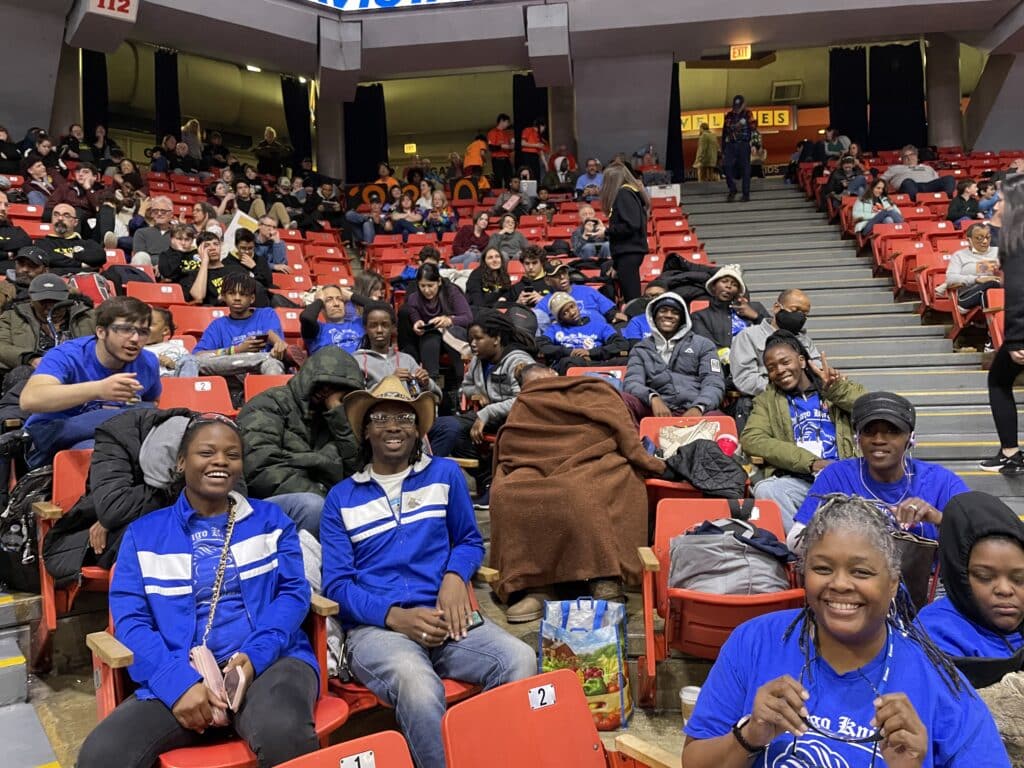
Both Jackie and Dieudonne have experience working with youth in STEM education, making them strong collaborative partners. Dieudonne is the CEO of the Global Leading Light Initiative, a non-profit in South Africa which supports young people in historically disadvantaged communities to acquire future proof skills, with the aim of reducing poverty and inequalities. Jackie is the founder and Executive Director of Agape Werks, Inc, a community based non-profit in Chicago with a mission to promote in young people an appreciation of math, science, technology, and engineering as strategic tools for success regardless of life circumstances.
The partnership between the students in Chicago and Port Alfred dates back to 2019, when Allo and Moore developed the “One Team Two Continents” concept after meeting through the Goldin Global Fellows program to explore cross-continental collaboration opportunities. This initiative envisions a youth-led, distributed team working together on robotics projects in an environment that fosters inclusion and cultural pluralism. The students from both continents convened under the banner of the Chicago Knights, a community based, borderless, and inclusive all-city FIRST Robotics team.
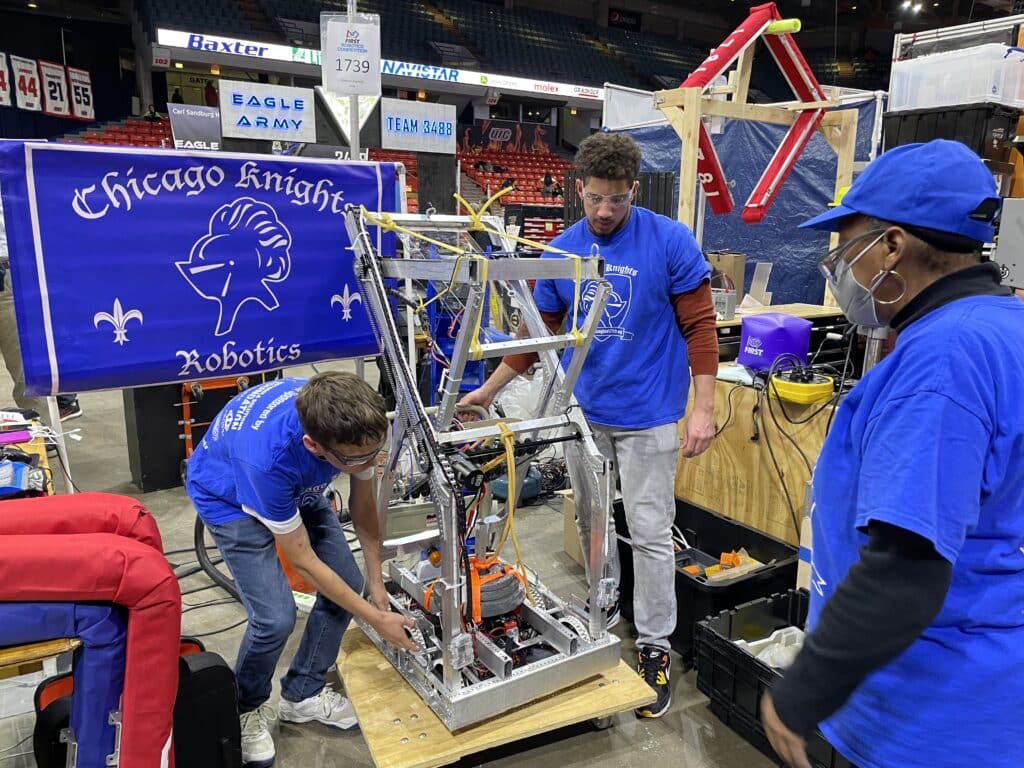
Prior to collaborating with Dieudonne, Jackie had been invited a few times to teach robotics in Uganda and South Africa. These opportunities did not meet her philosophy of teaching, which is to “not to become the expert in the room, but to work collaboratively with someone.”
Soon after Jackie and Dieudonne met, the pandemic hit and remote learning opportunities allowed for the students from South Africa to be involved in collaborative robotics programs. They collaborated remotely for an entire season of robotics competitions. Remote work did have its challenges, Jackie explains, “the way that I typically work really requires a lot of hand-on teaching.” While the virtual environment made it difficult for students to focus, especially in Port Alfred where they often faced the challenge of unstable internet connections and recurring “load shedding”, the students held on and kept coming back for robotics opportunities.
Things changed for the One Team Two Continents team when a grant from the U.S. Embassy's U.S. Mission to South Africa provided funding for students to travel between Chicago and Port Alfred. When applying for the grant, Jackie and Diedonne focused strongly on the fact that the kids from South Africa and Chicago would be working together as one team. Their project proposed to demonstrate the value of pluralism and social inclusion in a robotics environment. This allowed for the teens’ interest in robotics to be placed front and center while showing the value of pluralism and social inclusion through working together as a team.
The exchange between the students in Chicago and the students in Port Alfred went both ways, with the Chicago students having an opportunity to visit South Africa in October of 2022. Together the teammates built small robots and did exercises to develop capacity for working cohesively as a team.
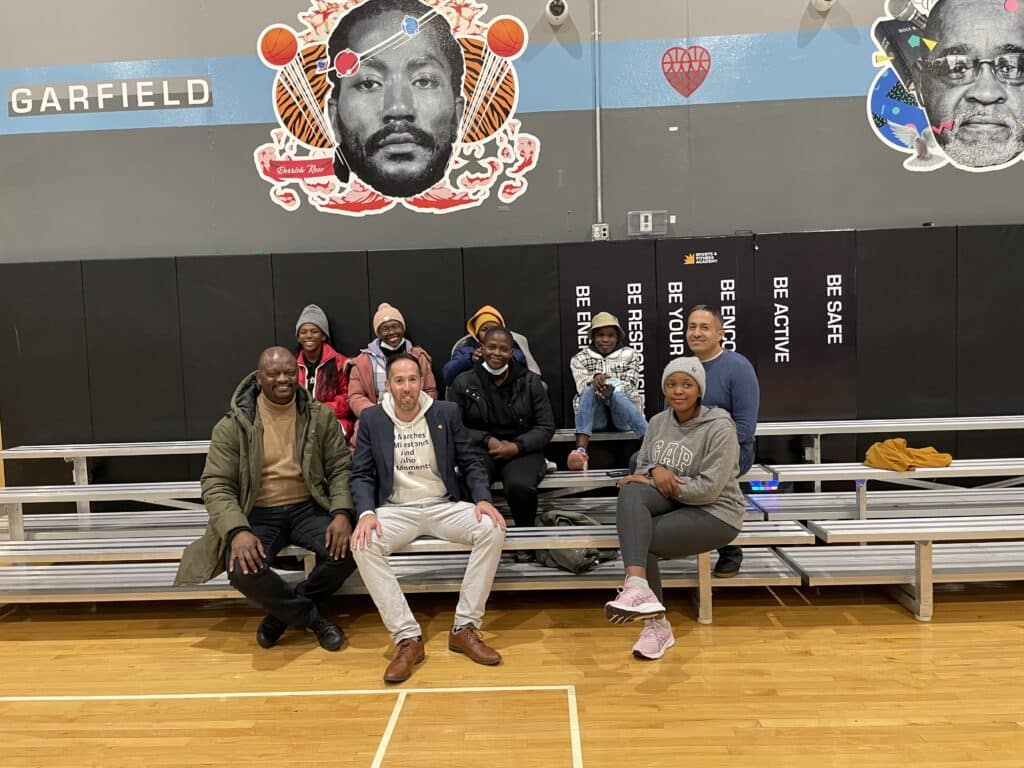
In one meaningful team building exercise, students were able to explore principles and practices of successful collaboration through a soccer game where the rules were altered to reflect the FIRST ecosystem’s values of “coopertition” and “gracious professionalism.” “Coopertition” is the practice of competing cooperatively in which a person will help their competition because the better they both are, the more they can do. In the same vein of competitive compassion,“gracious professionalism” is the idea of competing to the best of one’s ability, but to do it with grace and kindness. These two values harmonize well with Jackie and Dieudonne’s goals of pluralism and social inclusion because they encourage each member of the team to assess one another compassionately so that they can cooperate and work to each members’ strengths.
When the South African teens visited, they were taken on cultural tours of Chicago. These tours included all members of the team and many Chicago members visited places they had never visited. Students went to Little Village, Chinatown, and Robert Lindblom Math & Science Academy in West Englewood. Many of the South African students were surprised to see English as a secondary language in these neighborhoods, with the majority of signs being in Spanish in Little Village or Chinese in Chinatown. This encounter was particularly shocking to the adult South African on the trip who experienced apartheid, when assimilation to a dominant culture was expected. To see distinct Hispanic and Chinese cultural identities existing within a diverse society, and being celebrated by the community as a whole, was a new perspective and an example of the successes of cultural pluralism.
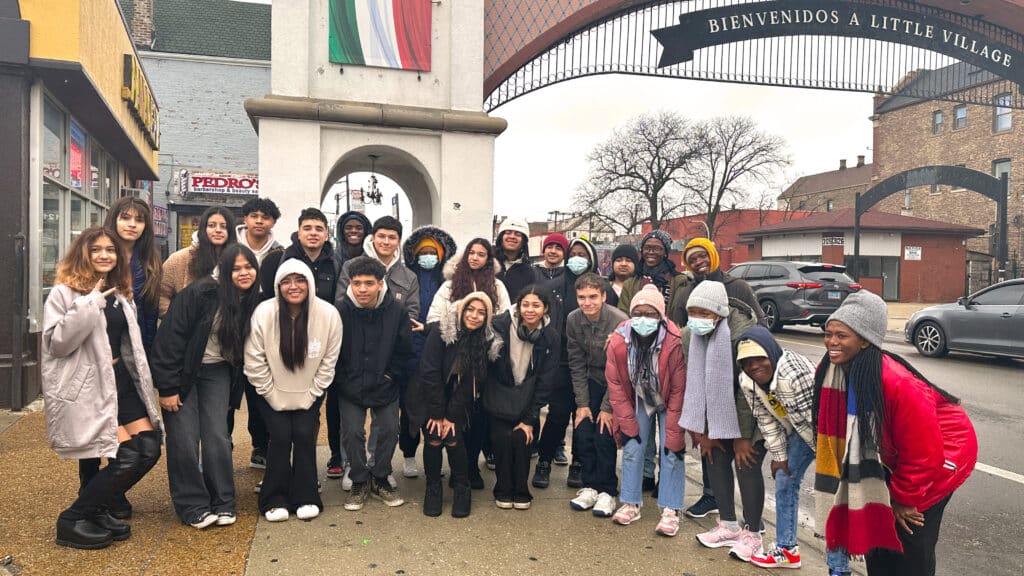
The teens who made up the Chicago Knights were incredibly dedicated to their team’s success, not only traveling internationally to learn robotics, but also sacrificing time from school and extracurriculars. The Chicago students missed Thursday and Friday for the competition, and a week of school to travel to South Africa in October. Hannah was a Chicago student who was new to the team this year. She was not able to travel to South Africa, but she worked consistently before and after the South African team arrived. For the competition, she took a break from her extracurricular activity of playing squash, missing a tournament to meet for robotics. This dedication to robotics helped the team members form close bonds and collaborate with one another and appreciate the diversity of the team.
The rules and guidelines for the FIRST Robotics competition came out in January, giving the team little time to build their robot in preparation. The 2022-2023 season of FIRST competitions was themed FIRST ENERGIZE, with activities encouraging the FIRST community to think about future energy sustainability. This challenge was inspired by the United Nations’ 7th Sustainable Development Goal, which is to ensure access to affordable, reliable, sustainable, and modern energy for all. The team built a mobile robot that was designed to play a custom game designed by FIRST. The robot uses a six-wheeled tank drive and is controlled remotely by a micro-controller called a roboRIO. It has an arm with a manipulator at the end which is composed of rollers that allow it to pick up and launch objects. The students built the entirety of the robot: interpreting drawings, measuring, cutting, drilling, and wiring electronics.
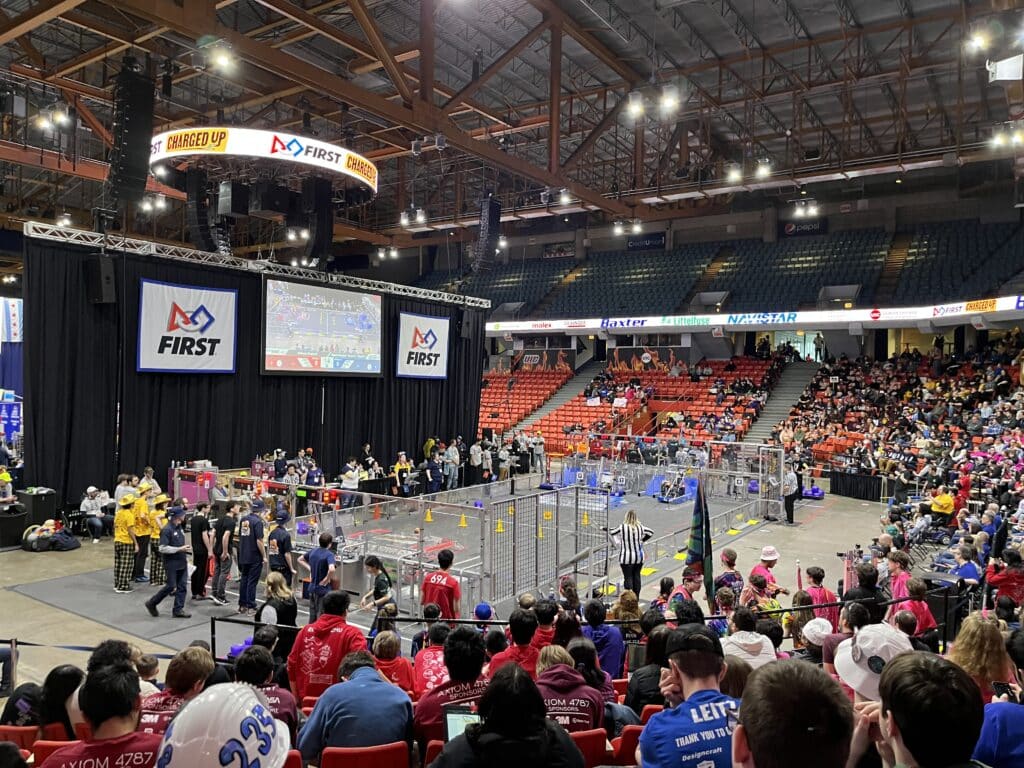
On the field were safety cones and inflatable spheres which needed to be gathered by the robots and moved to appropriate environments. Extra points could be achieved through creating links of particular objects within specific locations or by balancing the robot on an elevated platform with its teammates. Jackie and the Knights understood the game from a social perspective, referring to the manipulated objects as “cone people” and "square people” who could thrive by being placed together in diverse environments as a community which produces points as resources.
The team made an “Every-bot” design shared by the FIRST community which was designed to be accessible and constructible with basic tools. By focusing on the build, the team had a chance to get a lot of hands-on experience building by constructing the entirety of the robot in Chicago. The Chicago side of the team built an initial section of the robot, but when the South African students arrived they got to be a big part of finalizing the robot. Students learned skills and information on the sport to accomplish last-minute aspects of the build in the midst of the competition. One South African student named Litha came in without a great deal of hands-on experience but became a key member of the team working on electronics. She learned from mentors on the Knights and on other teams competing to gain the necessary skills to work on the electronics of the robot. Chicago students also stepped in to teach the South Africans what they had learned from prior builds. Reflecting on the process, Jackie noted, “I guess adversity builds strong bonds. We knew we had a deadline to meet, a very finite time to work on it, and they all worked together.”
Due to the timing of the South Africans arrivals and logistical challenges on the Chicago side, much of the building of the robot took place during the start of the competition. This came at the cost of missing the first day of competing, but provided bonding experiences and a lot of opportunities for the South African team members to gain the hand on building experience that they had been lacking. One student named Jalen, reflected on the building process: “We worked really hard. We would work from 9am-8pm because we had to build a whole robot in a week. We had to work quickly, make as few mistakes as we could, and stay focused.” Despite the rushed building process, the teens were very excited to participate in the competition and all came together to cheer when their robot made it to the competition floor.
As the teens on the Chicago Knights competed in the FIRST competition, they realized that cooperation was an essential part of the tournament. Many Chicago students went out of their way to teach South African students, who had limited experience building. For instance, Jalen was referred to as the “rivet master” for teaching the rest of the students how to use a rivet gun. Not only did teammates assist each other, but they were also helped by other teams. As the Knights crunched to build their robot, they were assisted by students from Lindblom to machine a ventilation pipe. Reflecting on her favorite memories working on the project, one student named Hannah reflected, “Cheering for our team at the competition was my favorite part. But we also got to go around and take pictures with other teams [...] I was shy to speak to other teams, but they were really nice and let me take pictures with them and their robots.” From start to finish, the FIRST competition was as much about compassion and collaboration as it was about competition, making it an excellent environment for cultural and intellectual exchange.
Promoting Justice for Detainees in Liberia
By John Kamma, Global Fellow from Liberia
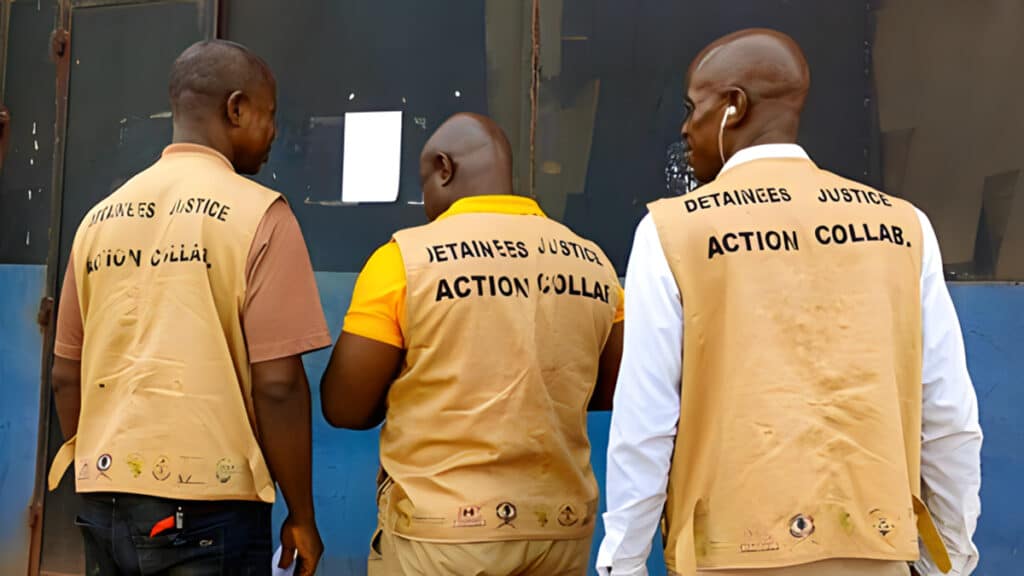
It is with great joy that I announce that I have won a €10,000 Euro grant from Catalyst 2030 to pilot a project focused on detainees in Liberia. I have already secured a permit from the Ministry of Justice to visit prisons and start working with detainees to review their cases. Together, with my local learning partners and the advocates, we will identify detainees whose rights have been violated and provide legal support to facilitate access to those rights.
“Today, we visited the Monrovia Central Prison and interacted with Prison authorities who were very pleased about our intervention to bring justice to the life of pre-trial detainees. This is a step toward our data collection process that will be used to advance evidence-based advocacy, demanding due process of law for pre-trial detainees in a competent court of jurisdiction.”—John Kamma
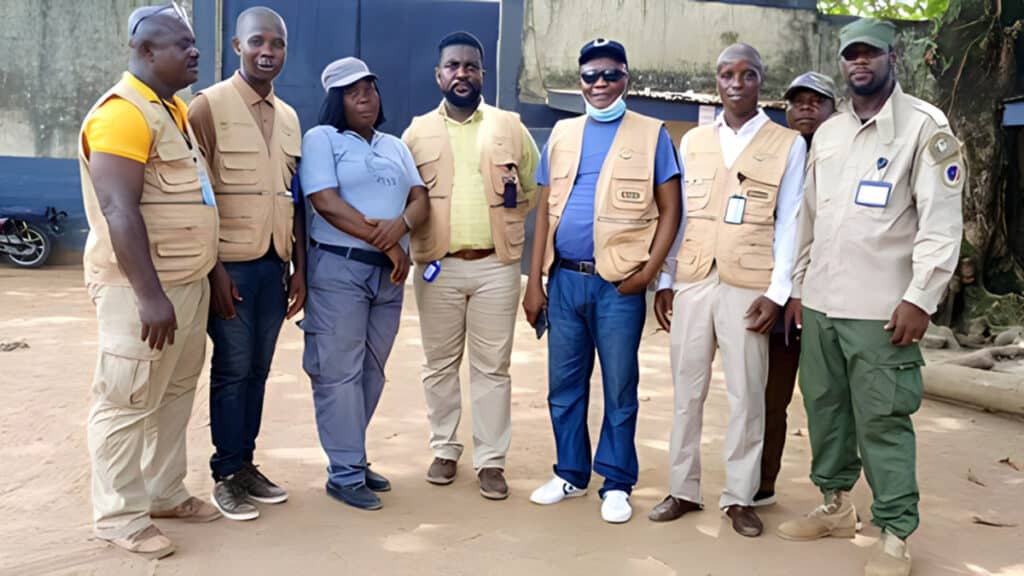
The project, Detainees Justice Action (DJA), seeks to; promote access to justice among detainees, support their integration back into the community, and provide sustained mental health support. We just started in Monrovia but the permit from the Ministry of Justice allows our project to scale across the country. The three-month pilot phase is now focusing on the identification of detainees whose legal rights were not met. Afterwards, we hope to start addressing the issues in court with support from the advocates.
Between June and December 2022, I was engaged in an extensive training program led by the African Civic Engagement Academy (ACEA). During that period, I had an opportunity to learn with over 2,000 participants coming from across the African continent. I applied for this opportunity because I understand that our work in the community requires constant learning, research, and networking. Throughout the program, I was exposed to knowledge about basic principles of civic engagement, inclusion, media management, non-profit management, and program design.
The whole program was conducted online, featuring multimedia content designed to expose us to different theories. I also learned a lot about practical applications from other participants. We exchanged experiences based on our unique actions in our respective communities. I was particularly impressed with the lessons surrounding the need for partnerships and collaborations. We learned that extending partnerships with the government and other civil Society Organizations can increase our chances of success in tackling the issues we face.
“Ensuring that the government does not see you as an obstacle is key to improving relationships, obtaining support, and achieving collective goals. Sometimes the government already possesses important information that is necessary for our work to be successful.” — John Kamma
Last year I was training at the African Civic Engagement Academy and whilst there I submitted a Civic Engagement Action plan detailing the work of Detainees Justice Action. This led to my recent invitation to attend the 2023 ACEA Summit which takes place tentatively on March 17-19 in Nairobi. I am so glad for this opportunity and I’m looking forward to it.
“The reviewers at ACEA selected me for the Summit because they were impressed with the quality of my Civic Engagement Action Plan and with my participation in the ACEA training last year.” —John Kamma
How Ibali Lam is Empowering Women Entrepreneurs in South Africa
To mark this year’s International Women’s Day, the UN has chosen the theme of Technology and Innovation for Gender Equality – an area familiar to Dieudonne Allo (Global Fellow from South Africa) who is leading the Ibali Lam program through his organization Global Leading Light Initiatives. Ibali Lam is an exceptional example of empowering women through technology, by providing women entrepreneurs the digital tools and innovative approaches to storytelling to connect with existing and new customers and investors.
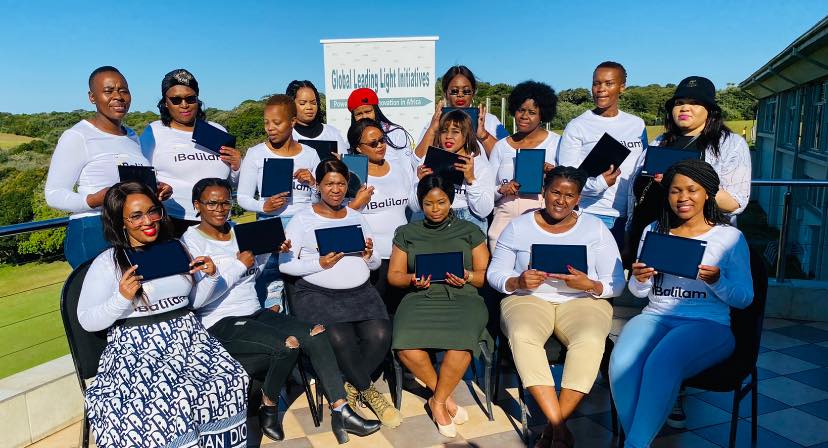
The project uses business storytelling, frugal innovation, investment readiness, and networking to help women whose businesses have been affected by COVID-19 to pivot new online models and engage existing and new audiences. The program also offers weekly roundtable sessions and one-on-one-coaching.
To mark International Women's Day, Global Fellow and CEO of Global Leading Light Initiatives Dieudonne Allo and Program Coordinator at Global Leading Light Initiatives Fatima Momoti share their insights on how their Ibali Lam program is improving women's lives, mainly through economic empowerment.
Marking International Women's Day
Fatima begins by elaborating on how women in today's world cannot interact without technology and storytelling.
“We need to empower ourselves with technology. If we are not going to move with the wave of technology, we will unfortunately get left behind and be stuck in that mentality of a previously disadvantaged group. Women need to be more in the forefront of development and innovation.”
She further elaborates on how the Ibali Lam initiative lifts women to achieve this.
"We are mainly in a rural area, so for these women to have a wider reach increases their income for their business. We come from setups that mainly have four to five people in a house, so having extra revenue means they can feed themselves and their families."
According to Fatima, when women beneficiaries understand what storytelling is they are able to better understand their customers and better craft their business online by using various social media platforms.
"Another component of the program is to ensure that we have a more holistic approach in helping these businesses accelerate and then from there help to set up the business aspect, the digital transformation."
Then, through investment readiness, women are introduced to potential investors.
"Women have been mainly talking to customers, and now it's changing from that to a potential investor. So, they get into that space when they can pitch to investors and get feedback."
This leads to more opportunities and stability for them.
Dieudonne places emphasis on women’s economic empowerment and its core role in the Ibali Lam program and importance for social justice
"Technology is advancing today, and every woman must empower herself to bridge the gap. Technology is a potent tool for women to transform themselves and empower themselves economically, because Ibali Lam is really about economic empowerment" -- Dieudonne Allo, Global Fellow from South Africa.
Gather as an Inspirational Path
Dieudonne highlights that Ibali Lam drew inspiration from the Goldin Institute’s GATHER program.
"The Gather program of Goldin Institute inspired the model of Ibali Lam. Women, especially in this part of the world, do not have access to technology, so we give them access; we provide internet data to them so they can access the online platform. Women get tablets, too.” he says.
Today, Dieudonne adds, one cannot interact without technology.
“Another thing without which you cannot interact is storytelling. For us, as Africans, storytelling is a very vital part of our culture. So, combining storytelling and technology women can connect to people and make them see value in their outputs and businesses.”
Ibali Lam’s Future Projects
Ibali Lam has to date supported 37 women and will continue to support women in other forms too. Concluding our conversation on a positive note, Dieudonne shares that they are working on a new project which will launch soon.
"Working with women, we can equip them with technological tools and their businesses can go online, but if they do not have access to finances, they cannot grow their businesses."
So, to support them, Ibali Lam has developed a new support program that will provide micro-grants for its alum. Follow Ibali Lam's work through their website.
Celebrating the Graduation of the 2022 Goldin Global Fellows Spanish Cohort
Creating an accessible leadership program for Spanish-speaking grassroots leaders
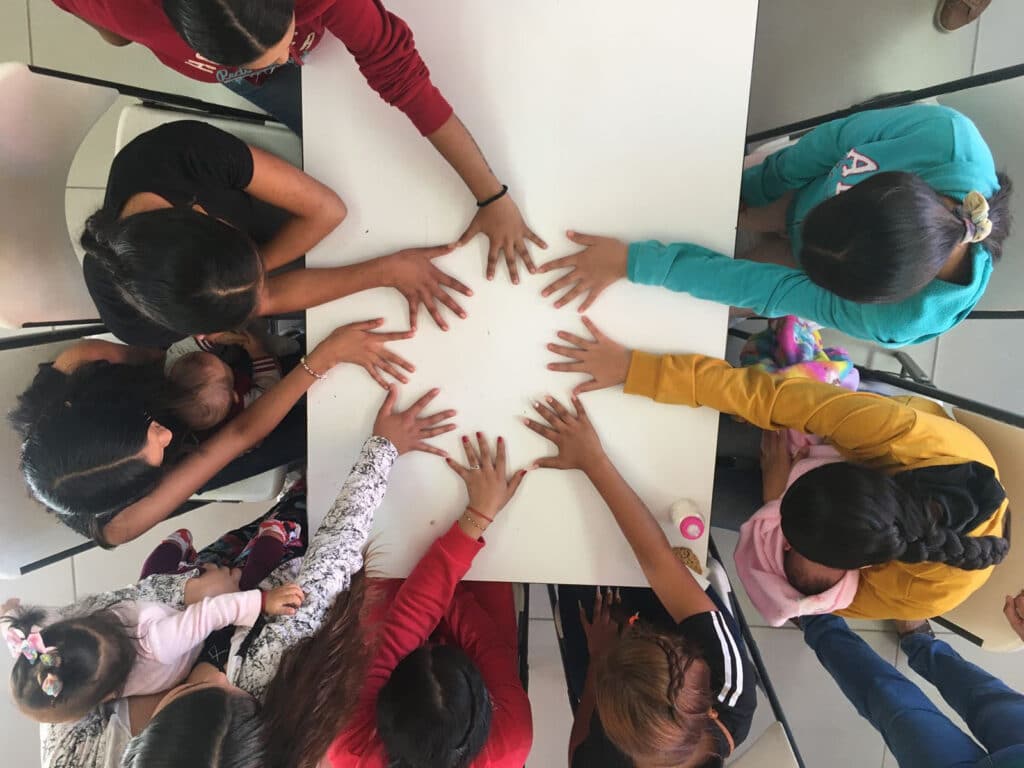
On December 10th we celebrated the graduation of the first Goldin Global Fellows program in Spanish language, where 17 Spanish-speaking grassroots leaders from eight countries in Latin America and Europe came together to create a new community of practice.
Since 2018, we've held onto the dream of offering the Fellows program in Spanish. True to Goldin Institute’s principles of ensuring that resources and connections are accessible to as many grassroots communities around the world as possible, offering the program in Spanish has long a priority for our whole team. Removing language barriers -- which included translating the curriculum, readings and videos in the GATHER Platform from English to Spanish -- was not an easy process. But I can say the effort to offer this course in Spanish has been worthwhile, especially for me as a Spanish-speaking activist who has been able to find a community who speaks in my native tongue and who are also working on both similar and different issues.
“Gather is knowledge and collective construction.” -- Luis Alomia, Colombia
During the recruitment process we counted on our Alumni, friends and colleagues from Colombia and Latin American countries to help us share the news of the application and spread the word. We were delighted to receive applications from a diverse group of grassroots leaders from over 10 countries that crossed many divides in our society, bring together youth and elders, leaders from rural places and main cities, victims of violence and former combatants. Together, these individuals represented a wide range of sectors, including environment, law, education, technology, peace and reconciliation, arts, memory, sports, theater, and more.
“Gather is a before and after of my leadership. I am happy since they contributed to broaden my vision and knowledge that will help me to build solutions that can be lasting over time and see communities as a treasure of active resources and that will be an example of good practices for other communities that want to join the transformation”. -- Natasha Duque Torres, Venezuela
It was truly a very diverse group, each doing beautiful work individually, but tied together by the common bond of being leaders on the front lines where life revolves around changing their communities and finding solutions every day. From these applicants, we selected 17 individuals who became the first Spanish-speaking cohort.
As a facilitator I was impressed when talking with our Fellows about the learnings and concepts delivered in the program, and realized how their perspectives and ideas about their community and social-change work had begun to develop and adapt. Indeed, they became more aware that new solutions had to be based on all the assets they always had but may not have seen in their communities. It was also moving to see how they started imaging a new understanding of leadership which counts on the whole community, giving opportunities to those often left behind. I was further impressed at how sensitive they became; in our conversations we sometimes cried noticing the changes they were going through and how new concepts gave them a vision of collectiveness.
"Gather has allowed me to broaden my horizons as a social leader by identifying and valuing resources and assets that we have as a community, as well as empowering the leadership of my colleagues based on the recognition of their individual strengths and interests in community work." -- Diana Rocio Gomez Torres, Argentina
Fellows felt that the course on the GATHER Platform was different from other courses because they had a strong sense of support from the Goldin Institute team and meaningful relationships with their peers.
It’s like a family that we can always count on, no matter what.
In our roundtable “Reflections and Critical Moments” one of the most broadly shared reflection was that the Fellows felt like they were not alone in this program, knowing there were other leaders around the world doing the same and learning alongside them. For example, Ernst from Haiti would tell us about the challenging times facing the Haitian population due to the political situation in his country, or Eva in Argentina would share that she faced many struggles for raising her voice against state violence. We also exchanged positive and happy stories too, for example Manuella shared about her journey from Quibdo (Colombia) to Spain to talk about how successful her project about football was there, or Nuria from México who got to be involved in a project to protect underage pregnant girls. We also had Martha from Guapi (Colombia) who graduated from her specialization during the Fellows program and Arturo from Bogota (Colombia) and his “Picaditos” Football matches with youth when they launched their book “La Prisión que Jamás me Contuvo” written by a former combatant. All of us looked forward to meeting each Saturday where we shared beautiful moments with each other during our weekly GATHER Roundtables.
“Gather is a seedbed in which the strengths, abilities and natural gifts of leaderships are brought out.” -- Geiner Arrieta, Colombia
So when the Program came to an end, Fellows wanted their graduation to be like a party; a celebration of life, cultures, learnings, our individuality and how this makes sense in community. Fellows celebrated with drinks from their territories, showing off their typical customs or any other item that represented them. We also had a freestyle performance by Johnathan, and a video of some musicians and dancers from the region where one of our youngest fellows, Luis Alomia, is from.
“My Gather experience has helped me to see that the actor of change that I want to be requires the participation of everyone in my community. Having grown up in a society where exclusion is the norm, Goldin has given me the necessary tools to be a true agent of change by collaborating with others and identifying our resources to be able to dream big together”. -- Ernst Djeride, Haiti
I have to say the best part of the celebration was the desire of Fellows to talk about the future and their optimism for new collective projects. They want to move forward, grow, and build together. Fellows Manuela and Arturo proposed four lines of work for Fellows in 2023:
-
- Creating a shared asset map with the purpose to realize a meeting of sharing vision. To have it real, we need a plan to know what we have, what can we do to meet us face to face together and develop our community visioning summit.
- Monthly meetings where each person of this cohort can lead one of the meetings.
- A directory of all the members of the Alumni network with their strengths and special topics and projects where they work.
- Participate in all the workshops set up by the Goldin Institute so we can learn, meeting new people and collaborate in new projects.
- We can share our networks, follow each other, and get to know what each one is doing, as well as and distribute what others are doing, including Goldin Institute’s social networks.
- We need help from the Goldin Institute to present our projects in case we need representation.
"Gather has given me the chance to meet my community again, open up to new listening, in order to collaborate on the paths we are charting together”. -- Nora Gabriela Fuentealba Rivas, Chile
And now, Fellows faithful to the principles they learned during the Goldin Global Fellows program wanted to remove barriers of distance so some of them made the efforts to meet with each other in person!
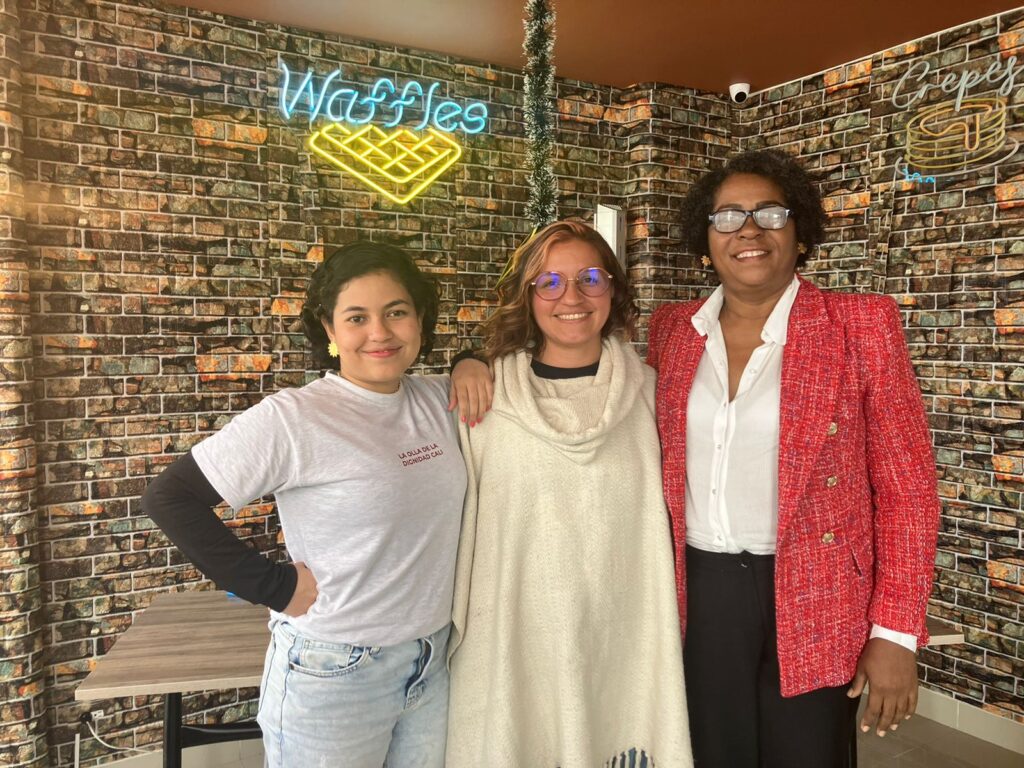
“As you may know this is the 20th birthday of Goldin Institute and I can’t think of a better way to celebrate our 20th anniversary than by welcoming you into our Global Family, congratulations to all of our new graduates on behalf of the Goldin Institute, and especially, on behalf of Diane Goldin, the Founder and Board chair of the organization.” - Travis Rejman, Executive Director of the Goldin Institute
Our 2022 Global Fellow graduates are stronger together
By Yusuph Masanja, Co-Facilitator of the Global Alumni Network

Since the inaugural cohort of the Goldin Global Fellows in 2018, the Goldin Institute has evolved the GATHER curriculum to remove barriers to access for grassroots leaders and to augment the pedagogy to work for the realities of our Fellows across the globe. One such development was the ability for Fellows to access the curriculum not only on iPads but on any internet-enabled device or smart phone which is most convenient for them. This change removes a significant barrier for Fellows who reside in remote places and lack reliable access to electricity, wifi and the latest gadget or repair services.
As a Facilitator of the program, our intentionality in removing barriers is why I am such an advocate of the GATHER approach. It is how our network of Alumni has grown to 150 Fellows from diverse backgrounds, including those leaders who are often left out of conferences or trainings, who now hail from over 40 countries. And we are confidently making space for more grassroots leaders to join us. The Community of Practice that Fellows continue to build, one cohort at a time, is proof that building change from the assets we have is a path to meaningful and inclusive progress.
This year we saw our third cohort of Fellows embark on the Global Fellows Program. The 2022 Goldin Global Fellows are 14 bold and wise grassroots leaders from across the globe, including Cote d'Ivoire, North Macedonia, the USA, Ghana, Nigeria, Zimbabwe, Nepal, Pakistan, Malawi, Bangladesh, Albania, Sierra Leone, and Kenya. Amidst our diversity, we are united by the desire to learn, reflect and implement proven ideas for community-driven social change in our respective countries.
At the graduation ceremony on 4th November, the 2022 Fellows demonstrated their achievements and shared their aspirations. The ceremony began with a message to all Fellows from the Founder and Board Chair of the institute, Diane Goldin who warmly welcomed the new Fellows to the network:
“I could not be more honored to have the opportunity to know so many talented leaders and know the innovative results. My congratulations for all your work in achieving your goals and for being a part of our global family. You are appreciated and loved.” - Diane Goldin
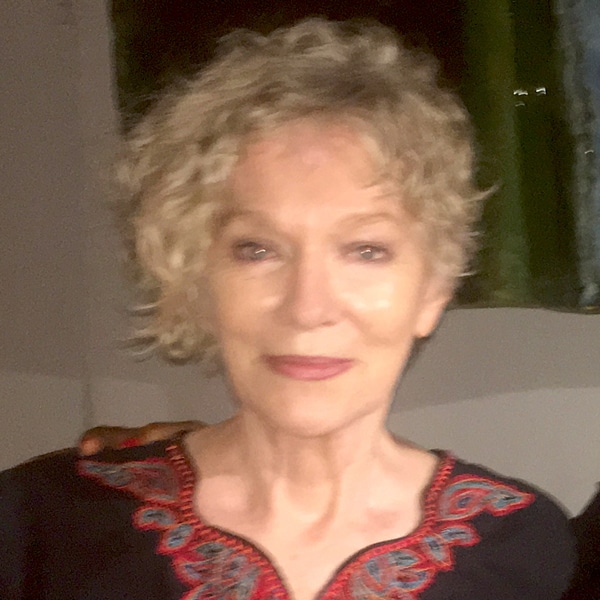
At the graduation, Fellows shared moving testimonies of how their five months through the program transformed their worldviews, their grassroots activism, and brought new friends into their lives. As a Facilitator, this feedback is so rewarding, which keeps me motivated to expand the opportunity for even more community leaders around the world. Here are a few quotes from some Fellows captured from the graduation ceremony:
"The process of assets mapping where we identified people, institutions, connections -- and all things which give us life in our communities -- helped us to see the abundance of resources that can be tapped to make progress." - Abdul Rahman Kowa from Sierra Leone.
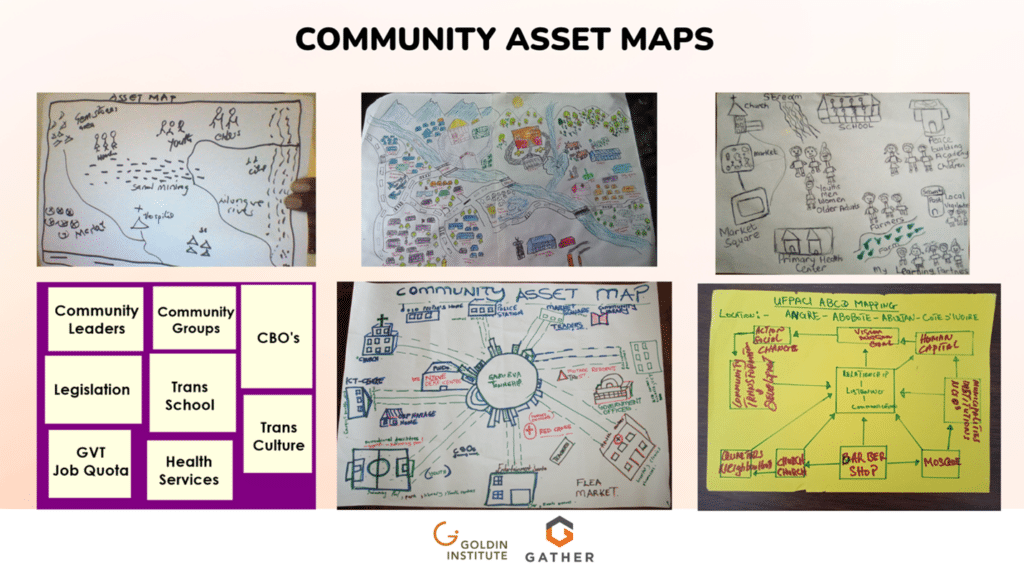
Florence Adhiambo from Kenya shared a great insight from what she learned during the program:
"The GATHER curriculum reminded me that leadership is not a position, but rather a commitment to building partnerships and trust with our fellow community members where everyone is aware that everyone has something to contribute."
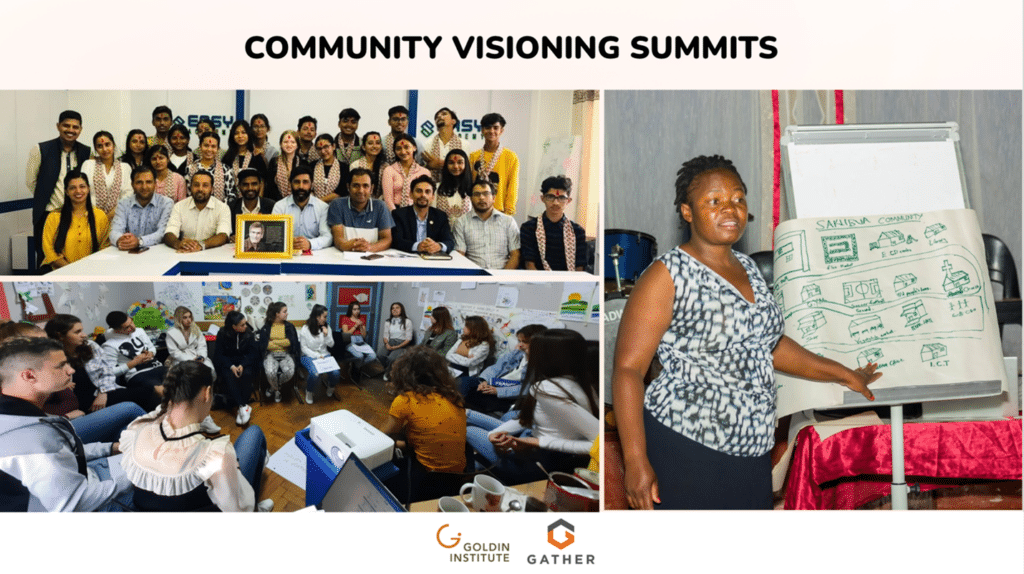
A key element of the curriculum on the GATHER Platform is the hosting of Community Visioning Summits; these allowed Fellows to share assets they have identified with broader community members, and to use appreciative inquiry to discover aspirations and shared priorities with the community. Central to the GATHER curriculum is the capacity for grassroots leaders to involve the voices of those most often left out in regular community processes and actively remove barriers to full participation.
In addition to sharing what they learned, Fellows shared key aspirations and next steps for how to collaborate with neighbors and global peers. In one example, Global Fellow Klementina Dobrevska from North Macedonia shared her next steps for addressing the issue of bullying and violence in schools:
Students who have disabilities are faced with a lot of pressure and bullying. Now we are working to promote children’s rights. So far, we have 500 students on board and in our second Community Visioning Summit we managed to leverage a new tool for youth participation which will allow us to get students’ opinions across the country.
As a final step in the Program, all Fellows partnered with their community members to develop a vision and outline next steps they will take to bring these aspirations to their respective countries. We will be sharing Fellows progress with you in the second edition of this article so that you can better understand and support their efforts. We believe everyone can make a difference no matter how small!
In addition to Fellows sharing their wisdom during the ceremony, they also performed poems, and songs, and led a candlelight ceremony. You can watch the entire recording of the graduation ceremony here.
Before closing, our Executive Director Travis Rejman, virtually presented the Graduation Certificates to each Fellow recognizing their successful completion of the GATHER curriculum and invited them to the Global Alumni Network. Staff members shared their messages of congratulations for the Fellows and Travis Rejman closed the ceremony with the following remarks:
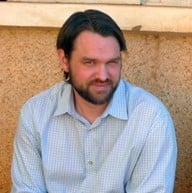
“It’s been an honor to learn together with you over these past 20 weeks. Over the last 20 years, we have been inspiring, connecting, and equipping grassroots leaders around the world so that they can learn from each other and work together to tackle really tough issues that all of our communities are facing. This celebration is a perfect example of what this work looks like in the real world. Thank you all for your dedication and hard work. We are very proud to stand with you and celebrate your accomplishments. We are very excited to welcome you into our global family.” — Travis Rejman.
